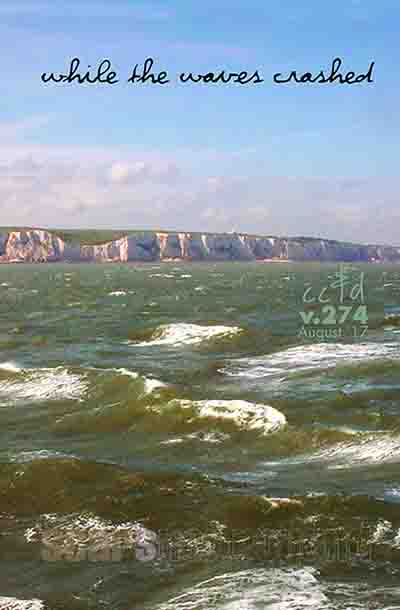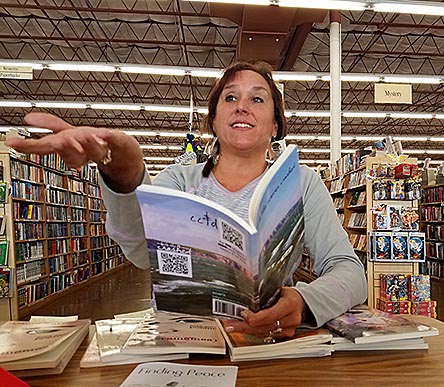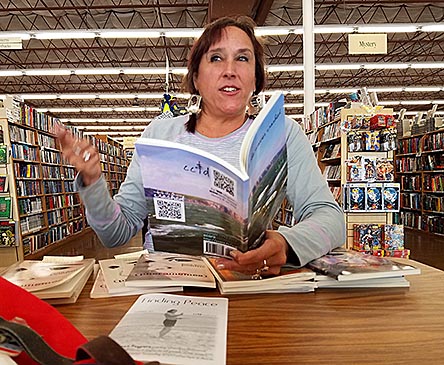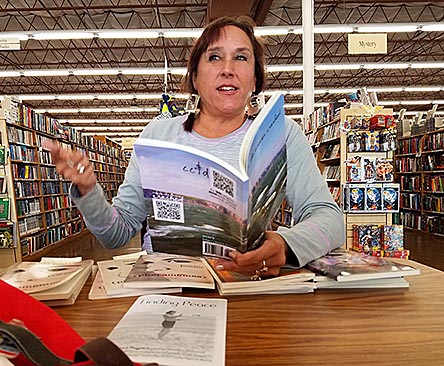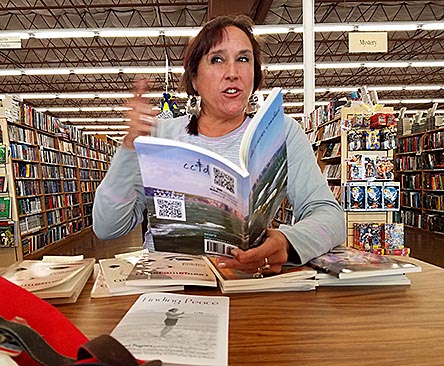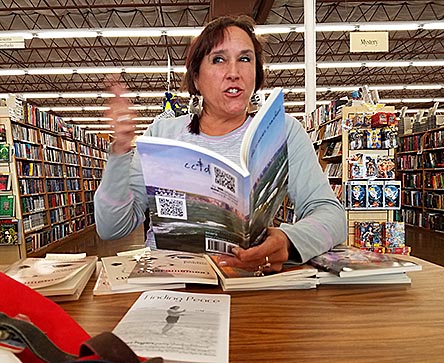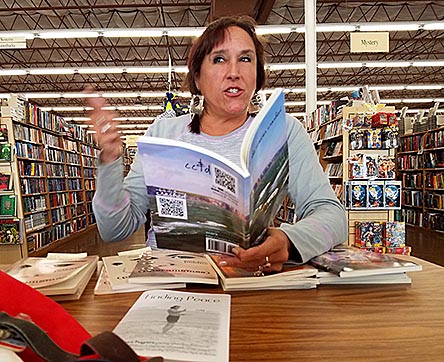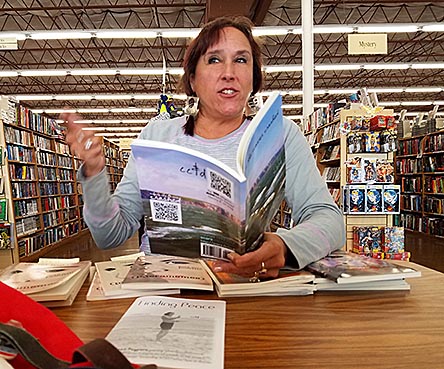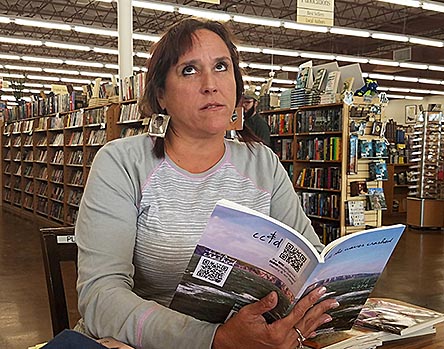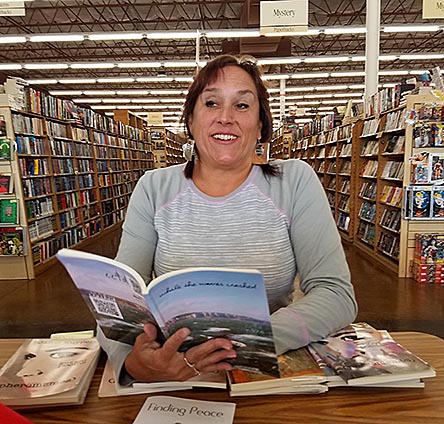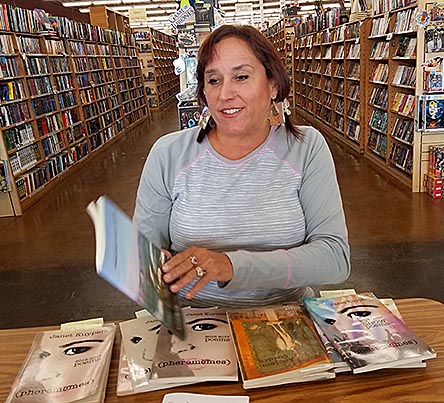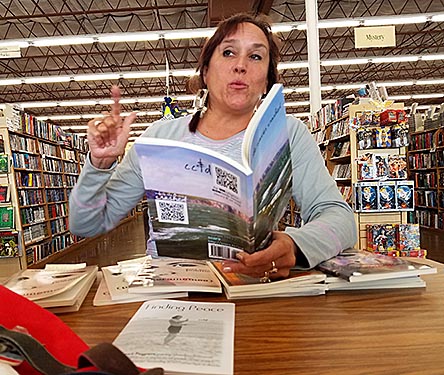While the Waves Crashed
cc&d magazine
v274, August 2017
Internet ISSN 1555-1555, print ISSN 1068-5154


Note that in the print edition of cc&d magazine, all artwork within the pages of the book appear in black and white.







Lazarus vs. Lazarus
CEE
People remember movies
In the BEEG moments media gives
For we do not remember days, but
Moments, that’s sage, that’s true
So, a byte or bit as signal fire
And we know we “remember”
And we forget the rest
Sometimes, conveniently;
If we think of Mel, BEEG, in
Braveheart,
We don’t think of late film montage
Involving passing of the years,
Longshanks
Increasingly choking on his breath,
The King of Scotland, hidden away
Palsied, disfigured, in pain,
Rivals and opponents once mighty
Over something which much mattered
A different way
Each, as though he who breathed
That last dying breath
Won y’know,
“he who dies with the longest bitterness”
I got that goin’ on right now,
Yelling at The King of Scotland
On wifeunit’s social media
For, there were giant wrongs done
In the Earth
In those days
|



Self vs. Group
CEE
Campus newsrag cropped the photo
So’s it looked like
Beyond the seven people
At the reading
Of artsy-fatsy poetry birthed in classroom
There might be more, attending
Since, hey,
Everyone knows all want their own table
All to themselves
As all strangers have cooties
Think, “seats on the schoolbus”,
But, given mini-Fort Boonesborough layout
Poetrix at podium jammed back to wall
Of niche hardflanked by bookshelves
Rising unto central air,
Maybe, if newsrag shutterbug
Kept backing, it’d be microdot shot
Of the South Pole camp Michael Palin
Crapped at,
I saw the “online” version
Lip curled, I almost commented,
“There is only one real poet, in this Town
And HE, was not invited”
But I noticed the many weeks it’d been online,
No Comments
So, I closed my browser, reopened it
And cleared my History
And all pretense, vanished
All pretense, eventually does
|



Coal Tipple
Charles Hayes
Derelict now for more than 25 years, the grime covered coal tipple rises from the coal dust and slate like some kind of huge tin man from the wizard of Oz. Shrouded in the hollow’s misty light as the sun breaks the ridge, the old mine takes on an almost magical quality. And it is quiet. A time when the night has retired and the day is only beginning to stretch. Perched here on the porch of my hillside shack above it all, I watch the black hole beyond the tipple. It is time.
Looking like black sticks, their hard hats blazing carbide, Biff and Spike emerge from the hole bearing a makeshift stretcher. On it, wrapped in the canvas cover of a mining machine, lies a dead miner. Switching off their lights but not pausing to rest, they trudge along the track and pass under the tipple. There, seemingly fueled by an inexhaustible strength, they leave the track and disappear into the green hillside below my shack. I can hear them talking between gasps of air as they wind their way up the path.
“I ain’t never seen nobody cut up like this before,” Biff says. “What we gonna tell his wife, Spike?”
“God damn it,” Spike replies. “Just shut up and haul. My boy was worse than this. The jaws of that thing got a taste of us with him. Jesus God, they’ll want me to operate that thing next.”
My wife, Jenny, having heard their voices, joins me on the porch.
“Oh Lord, Joe. Are they headed up this way again?”
Knowing the ways a bit better from my side, I try to instill in Jenny a calm that doesn’t come easy.
“Fraid so darling. Just like clock work ain’t it?”
Not one for two ways about something, Jenny lays it out pretty clear.
“Well Joe, just pretend that they ain’t here. Let ‘em come every morn if’en they want. We’ll just not see ‘em. And they can’t make us.”
The stretcher at their feet for the first time, Biff and Spike, hats in hand, look up at Jenny with white socketed eyes, black faces ashine with sweat. Spike, thinking how it was with his boy, says, “I’m sorry.......”
“I don’t see you and I don’t hear you Spike,” interrupts Jenny. “Same goes for you Biff.”
Looking down at the canvas lump, Biff does the unusual and actually speaks during this visit.
“But this here’s Joe, Jenny. Don’t you want to take care of him?”
“I don’t see you.” Jenny replies.
Looking to the empty chair at her side, Jenny continues.
“You see or hear anything, Joe?
“Just another quiet morn above a dead mine,” I say. “Just go on back inside, Jenny.”
This old soiled tipple of yesteryear at a very special time. I figure many out there would find it spooky and unclean. But out there is clearly beyond the pale, no doubt here. Besides into these reaches can not be seen. I can watch out there come and go across their flat tableaus. Yet if our eyes meet nary a connection will be made. Like one way mirrors, I can look out but they can not look in.
|

Charles Hayes bio
Charles Hayes, a multiple Pushcart Prize Nominee, is an American who lives part time in the Philippines and part time in Seattle with his wife. A product of the Appalachian Mountains, his writing has appeared in Ky Story’s Anthology Collection, Wilderness House Literary Review, The Fable Online, Unbroken Journal, CC&D Magazine, Random Sample Review, The Zodiac Review, eFiction Magazine, Saturday Night Reader, Cha: An Asian Literary Journal, Scarlet Leaf Publishing House, Burning Word Journal, eFiction India, and others.
|



G-A-Y, Evolution of Shadow Into Substance
Copyright R. N. Taber 2016
My world, it was a shadowy place,
closet with the door barely ajar,
a galaxy where neither sun, moon
nor stars had the stomach to come out
and shine
I ate, drank and breathed shadows,
body and mind all but crushed
by temporal divisions, pulling me
this way and that, yet underestimating
the spirit
All but dead, it stirred, a rebel spirit
now toeing at the closet door,
now kicking it wide open, the better
to enjoy all the womb-like nourishment
of aspiration
My world, it was filled with the light
of an imagination nurturing hope,
addressing vibrant stirrings of new life
metamorphosing self-pity into barefaced
willpower
Sun, moon, and stars now shine on me
as on anyone once bound to Earth
by its umbilical cord, cut according
to its nature by any blade to hand, witness
blood stains
Now, my only darkness, that of sleep,
no fear that my sexuality demand
I (ever) make apology for its being gay
as I wake to your steady breathing, sweeter
than birdsong
|



haiku (again)
John Yotko
Lie in bed staring
Awake, or lost in a dream
Twisters strike again
|







haiku inspired by Buson
(calling)
ayaz daryl nielsen
distant train whistle
sounding like a young calf
calling for momma
|

about ayaz daryl nielsen
ayaz daryl nielsen, veteran, former hospice nurse, ex-roughneck (as on oil rigs) lives in Longmont, Colorado. Editor of bear creek haiku (26+ years/135+ issues) with poetry published worldwide, he also is online when you search for bear creek haiku - poetry, poems and info.
|







haiku inspired by Buson
(chanting)
ayaz daryl nielsen
once a drug-dealer
shaven head and chanting
‘hare krishna’ ‘hare krishna’
|

about ayaz daryl nielsen
ayaz daryl nielsen, veteran, former hospice nurse, ex-roughneck (as on oil rigs) lives in Longmont, Colorado. Editor of bear creek haiku (26+ years/135+ issues) with poetry published worldwide, he also is online when you search for bear creek haiku - poetry, poems and info.
|







haiku inspired by Buson
(past)
ayaz daryl nielsen
days becoming longer
my grandparent’s living room
further in the past
|

about ayaz daryl nielsen
ayaz daryl nielsen, veteran, former hospice nurse, ex-roughneck (as on oil rigs) lives in Longmont, Colorado. Editor of bear creek haiku (26+ years/135+ issues) with poetry published worldwide, he also is online when you search for bear creek haiku - poetry, poems and info.
|

 

See YouTube video from 8/12/17 of John reading ayaz daryl nielsen’s poem “haiku inspired by Buson (past)”, John Lowther’s Sonnet from 555 “the general will was an abstraction” and Nicole Surginer’s poem “Timeless” from “While the Waves Crashed” at “Poetry Aloud” open mic.
|



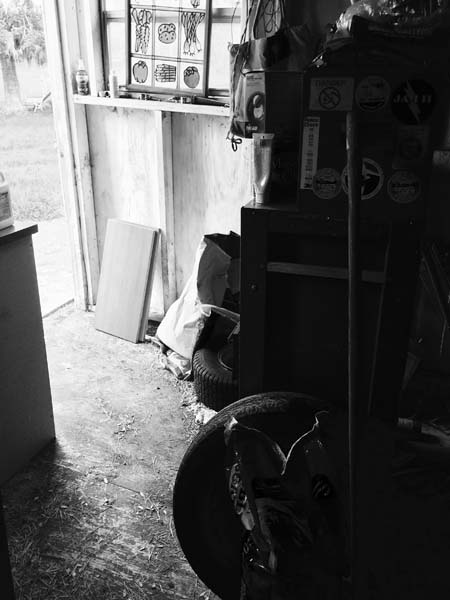
Barn Light, photography by Rose E. Grier



morning, riverside
ayaz daryl nielsen
may the loon’s cry end
it’s all about loss and
these goodbyes
because I was wrong
the sun gives me some
warmth, yet, it’s not
enough, noisome loon
it’s only not enough
|

about ayaz daryl nielsen
ayaz daryl nielsen, veteran, former hospice nurse, ex-roughneck (as on oil rigs) lives in Longmont, Colorado. Editor of bear creek haiku (26+ years/135+ issues) with poetry published worldwide, he also is online when you search for bear creek haiku - poetry, poems and info.
|



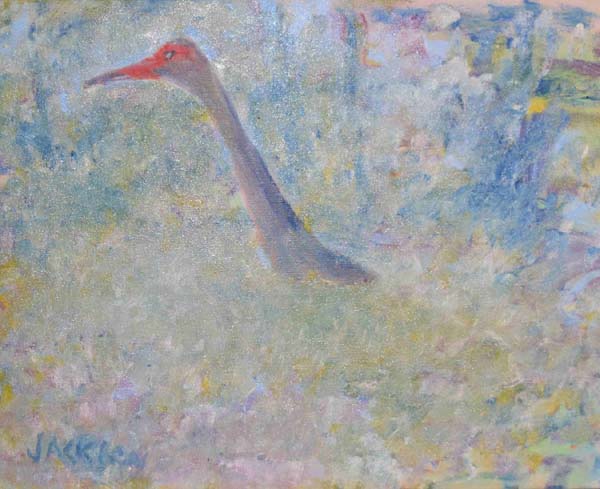



i still care
Linda M. Crate
i shouldn’t care, but i do. i am afraid that this is a wound unhealing. i will return here a thousand times trying to convince myself not to become the monster to destroy you, but wanting one to destroy you all the same. when i saw you in maine i thought i would be cold and indifferent and apathetic as you, but my heart leapt into my throat as i mouthed “fuck” a few times and ran into the bathroom to avoid this parsing of my heart and mind. my mind knew better, but my heart again fell for the wayward wolf who tears love apart in the name of his lust. i have a thousand tea leaves, but i cannot strike her. she’s not the one that hurt me. you are.
|

Linda M. Crate Bio
Linda M. Crate is a Pennsylvanian native born in Pittsburgh yet raised in the rural town of Conneautville. Her poetry, short stories, articles, and reviews have been published in a myriad of magazines both online and in print. She has three published chapbooks: A Mermaid Crashing Into Dawn (Fowlpox Press - June 2013) and Less Than A Man (The Camel Saloon - January 2014), and If Tomorrow Never Comes (Scars Publications, August 2016). Her fantasy novel Blood & Magic was published in March 2015. The second novel of this series Dragons & Magic was published in October 2015. Her third novel Centaurs & Magic was published November 2016.
|



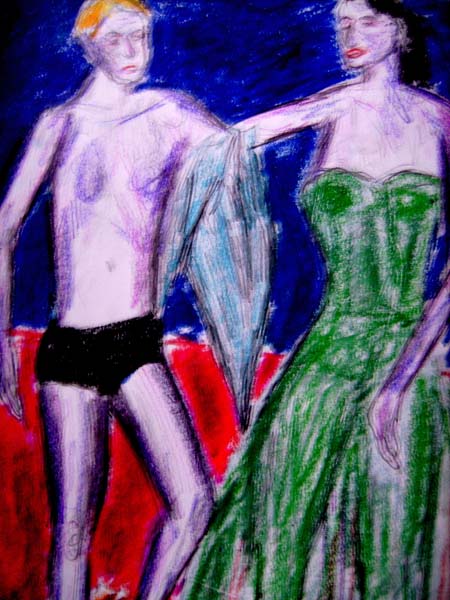



raven of flames
Linda M. Crate
i have to convince myself to forgive you time and time again. sometimes i feel sadness when i remember, but mostly i recollect my rage for everything that’s happened. the fury you said i never had. you probably want to remember me as a fragile shell about to fall inward upon itself. a weak thing dead and dying in the throes of your winter, but i shed the title of rabbit some time ago. i am the war raven rising from the same ashes of chaos that phoenixes do. i am not afraid of your rejection anymore. i want it. i want to use your own wickedness as the noose to hang you. i want you to drown in the despair that you’ll never be a good man, that you never were one.
|
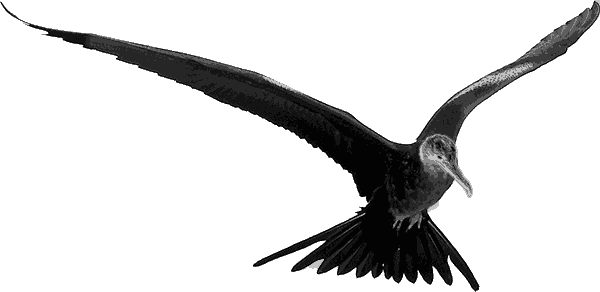

Linda M. Crate Bio
Linda M. Crate is a Pennsylvanian native born in Pittsburgh yet raised in the rural town of Conneautville. Her poetry, short stories, articles, and reviews have been published in a myriad of magazines both online and in print. She has three published chapbooks: A Mermaid Crashing Into Dawn (Fowlpox Press - June 2013) and Less Than A Man (The Camel Saloon - January 2014), and If Tomorrow Never Comes (Scars Publications, August 2016). Her fantasy novel Blood & Magic was published in March 2015. The second novel of this series Dragons & Magic was published in October 2015. Her third novel Centaurs & Magic was published November 2016.
|



the wicked things you’ve done
Linda M. Crate
i want to see your tears. i want to cave into this rage i have for you, and i want to be the primordial fury of my moon mother to smother you in all my hurricanes but you aren’t worthy of my deepest disdain or fury. you are not worth it to become a monster. people like you will undo themselves, and so i will wait for karma to smack you harder than i possibly could. i will watch as your hopes and dreams are set on fire before your very eyes, and i will do nothing to spare them. then you’ll only know a forth of the pain i’ve been in so i hope it multiples so that you can find no peace in sun or moon or twilight. so you’re always forced to remember all the wicked things you’ve done.
|

Linda M. Crate Bio
Linda M. Crate is a Pennsylvanian native born in Pittsburgh yet raised in the rural town of Conneautville. Her poetry, short stories, articles, and reviews have been published in a myriad of magazines both online and in print. She has three published chapbooks: A Mermaid Crashing Into Dawn (Fowlpox Press - June 2013) and Less Than A Man (The Camel Saloon - January 2014), and If Tomorrow Never Comes (Scars Publications, August 2016). Her fantasy novel Blood & Magic was published in March 2015. The second novel of this series Dragons & Magic was published in October 2015. Her third novel Centaurs & Magic was published November 2016.
|


NASA visualization of sun and moom






Bass
Oz Hardwick
These strings are antiques, dead
as bass on a slab. When I was a kid,
I’d walk through the fish market early,
and the smell still takes me back.
Our first gig was a church hall,
the summer of punk: cleared the place.
Later, we sat on the quay, Thunderbird drunk,
smoking home-grown, scrying our futures
in fish-slick ripples. Now these notes
are blunt sonar, tracking time.
We once stole a dinghy, rowed to nowhere
and back, left it like it had never gone.
Ever since, waves of What if? have hammered
at my shore. Tight as a hawser in a Force 8,
I finger the history of bottom E. Cast off.
If it’s too loud, you’re too old. Sail me back.
|



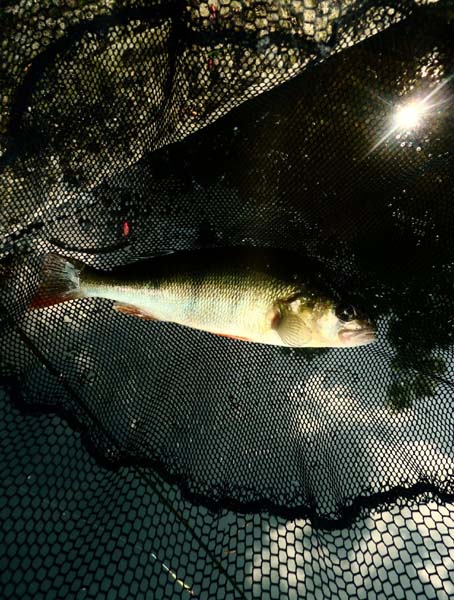
324169_353739184641583_100000165121149_ 1697567_71663315_o,
photography by Eleanor Leonne Bennett


Eleanor Leonne Bennett Bio (20150720)
Eleanor Leonne Bennett is an internationally award winning artist of almost fifty awards. She was the CIWEM Young Environmental Photographer of the Year in 2013. Eleanor’s photography has been published in British Vogue and Harper’s Bazaar. Her work has been displayed around the world consistently for six years since the age of thirteen. This year (2015) she has done the anthology cover for the incredibly popular Austin International Poetry Festival. She is also featured in Schiffer’s “Contemporary Wildlife Art” published this Spring. She is an art editor for multiple international publications.
www.eleanorleonnebennett.zenfolio.com
|



Silence
Eric Obame
Silence
Sinking into shadow
Face down
Tears on my pillow
He thrusts
Again
Again
His strong hands pressing my neck
A warning
On and on, it goes
Body
Can’t feel it anymore
Take it
Thing
Screamed
No one comes
Silence
Owned
Groans
Done?
Done
He falls
His breath on my right ear
Hairy chest on my back
He caresses me
Warm liquid inside me
He lets go
“Yeah,” he exhales
He smiles, joy
Leave me alone
|



Perfect Rest
Robert Ronnow
Yr cancer is inevitable as love.
You didn’t last forever. The pain
wasn’t the main problem, unconsciousness
was. Dad cannot see or hear,
the walls of the house contain just dust,
that’s it, and if he shows up as a ghost
I’m lost, all my theories false.
Dr. Cherry certified my cancer as a cyst.
A drupe, a stone, a past mistake.
I left the examining room elated,
and have gone on to conflate my happiness,
relief, with that of the whole village.
The message is: to the east and west, the self
which is carried around as a pound of garbage.
“I like to be kissed before I’m fucked.”
And what is poetry anyway. Its role,
local and global. Well, I for one have no
friends or family sufficiently interested
to come to a reading. Don’t take offense,
we prefer novels, and especially movies,
coffee, sugar, oil, parrots, ponies, you
name it. Seven goes to six. Prices
bust and burst, but life (and school) goes
on, or whatnot. Atomic bubble gum. Protein computer.
Grass roof. Sun spot. Perfect error.
In the mirror where everybody hides the body.
Finally, I have been going for walks, girls
with protection dogs, black flies in my eyes.
Peace of noon, bird siesta. August returns,
the snow flies. Did you survive summer,
beat the reaper? I hope so, and yr fern allies.
Perfect rest is priceless, paradise.
|

Robert Ronnow Bio
Robert Ronnow’s most recent poetry collections are New & Selected Poems: 1975-2005 (Barnwood Press, 2007) and Communicating the Bird (Broken Publications, 2012). Visit his web site at www.ronnowpoetry.com.
|



[Darling, I don’t do object permanence.]
John Lowther, Sonnets from 555
Darling, I don’t do object permanence.
I wish the virgin would’ve had an abortion.
All things counter, original, spare, strange.
What’s dry feels drier, what’s wet feels wetter.
There’s a lot of time there’s nothing to do.
Go christen that room with your naked body.
Fucking a young person means missing the point.
The same goes for the pure repetition.
Education does not exist to persecute you.
The sooner you get that through your head the better.
My interests are very singular.
I wanna be screwing when the nightmare comes.
555 is a collection of untitled sonnets whose construction is database-driven and relies on text analytic software. I crunched and analyzed Shakespeare’s sonnets to arrive at averages for word, syllable and character, these averages became measures for three sets of sonnets. The lines are all found, their arrangement is mine. Values for word, syllable and character were recorded. Typos and grammatical oddities were largely preserved. The line selection isn’t rule-driven and inevitably reflects what I read, watch, and listen to, thus incorporating my slurs and my passions as well as what amuses and disturbs me. These sonnets were assembled using nonce patterns or number schemes; by ear, notion, or loose association; by tense, lexis, tone or alliteration. Think of Pound’s “dance of the intellect among words”— The dance in question traces out a knot (better yet, a gnot) that holds together what might otherwise fly apart. I espouse only the sonnets, not any one line.
|

 

See YouTube video from 8/12/17 of John reading ayaz daryl nielsen’s poem “haiku inspired by Buson (past)”, John Lowther’s Sonnet from 555 “the general will was an abstraction” and Nicole Surginer’s poem “Timeless” from “While the Waves Crashed” at “Poetry Aloud” open mic.
|



[Enough smiling is enough.]
John Lowther, Sonnets from 555
Enough smiling is enough.
These animals eat humans.
Someone was always watching.
This is the shape of reality.
Deadpan, and deadly serious.
Boredom, irritation, exasperation, humiliation.
Amplification comes down to the local level as well.
Popularity is the slutty little cousin of prestige.
There is no final reconciliation and no final peace.
To see that the world does not exist, that there is no world, it is enough to think of the great mass of banalities that an infinite number of imbeciles believe the world to be.
555 is a collection of untitled sonnets whose construction is database-driven and relies on text analytic software. I crunched and analyzed Shakespeare’s sonnets to arrive at averages for word, syllable and character, these averages became measures for three sets of sonnets. The lines are all found, their arrangement is mine. Values for word, syllable and character were recorded. Typos and grammatical oddities were largely preserved. The line selection isn’t rule-driven and inevitably reflects what I read, watch, and listen to, thus incorporating my slurs and my passions as well as what amuses and disturbs me. These sonnets were assembled using nonce patterns or number schemes; by ear, notion, or loose association; by tense, lexis, tone or alliteration. Think of Pound’s “dance of the intellect among words”— The dance in question traces out a knot (better yet, a gnot) that holds together what might otherwise fly apart. I espouse only the sonnets, not any one line.
|



[The general will was an abstraction...]
John Lowther, Sonnets from 555
The general will was an abstraction, but general animosity is concrete, lived, and suffered.
Control the food supply, and you control the people.
Tell me again.
Whenever governments adopt a moral tone—as opposed to an ethical one—you know something is wrong.
Our struggle is your struggle.
Now everyone knows.
But one day we must come to see that an edifice which produces beggars needs restructuring.
There is no minimalism in a slum.
Then, together try to do something about it.
555 is a collection of untitled sonnets whose construction is database-driven and relies on text analytic software. I crunched and analyzed Shakespeare’s sonnets to arrive at averages for word, syllable and character, these averages became measures for three sets of sonnets. The lines are all found, their arrangement is mine. Values for word, syllable and character were recorded. Typos and grammatical oddities were largely preserved. The line selection isn’t rule-driven and inevitably reflects what I read, watch, and listen to, thus incorporating my slurs and my passions as well as what amuses and disturbs me. These sonnets were assembled using nonce patterns or number schemes; by ear, notion, or loose association; by tense, lexis, tone or alliteration. Think of Pound’s “dance of the intellect among words”— The dance in question traces out a knot (better yet, a gnot) that holds together what might otherwise fly apart. I espouse only the sonnets, not any one line.
|



morphine #92
Patrick Fealey
it’s not a mind-wash
i’m fighting against lawyers
it’s more like
i’m a mental case
and i did it to myself
imported this fog
it’s easy to see
when you have been without it
sober contrasting
when you’re drunk two years
you don’t see what you’re missing
it’s the same morning
i’ve got a vantage
i had perfect clarity
a few days ago
i see what’s at stake
i feel how close the slip-up
the case of dumb-ass
i want some more sleep
but i drink coffee instead
universal
a pile of morphine
sits upon my compact desk
waiting for the con
beautiful slaughter
those inspiring flashes of fin
blues! hearts leap and cast!
cab to the island
1 am and twenty bucks
five minutes to sleep
i don’t let her sit
we take off from the city
her stop, one from mine
i gel my hair down
the roosta days are over
the mess is too close
|



She’s So Heavy
Greg G. zaino
Making way to a school locker,
Beverly endures front entrance dread.
The spit, sneers, and name calling, crowded her ears.
Daily- unabated, the brutality of words-
words, like the hacking of a machete,
taking a scrap at a time.
She ran the morning’s gauntlet,
bearing her measure as best she could
in terrible humility.
Her obesity seemed everyone’s concern,
but her own.
Boys were cruel, the girls, far worse,
especially in the showers after Gym class.
“Hey Fat Bitch- Moby Dick- Great White!”
Their cruelty never slept.
Graffiti on her locker, food thrown at lunch,
dog shit at her desk...
Years prior, tears spilled off her cheeks,
but that only enticed them.
She learned long ago
to bottle her feelings- cease the display of hurt.
In hurried silence, she passed them by
committed to memory,
the faces- their arrogance- the cruelty.
She detested these animals- wished them all to hell,
her heart knew hatred...
On a Friday morning,
the literal day of Templar slaughter,
they waited like salivating Jackals,
but instead,
the fat girl spoke first.
Out it came-
her dad’s nickel plated, Sig Sauer automatic.
Pandemonium ensued and blood gushed.
The dogs pleaded, tried to run, but too late now-
shrieks of terror flooded the hallway.
Counting down as she squeezed the trigger,
her targets, spun and fell,
again and again, until 13 lay dead.
White eyed- the shooter roared, “No! Fuck ‘You’ Bitches!”
One round left, turning the gun on herself,
Beverly squeezed the trigger a final time.
“Bang!”
It was complete...
|



Dexter Street
Greg G. Zaino
... In a defunct textile town- one mile square,
white trash, poor black, Asian, and Hispanics;
a Rhode Island welfare community, crammed into a city gone insolvent.
Hard-hitting lessons for the young- unsympathetic for the sick.
Little sanctuary to suggest- in this shit hole of Old New England.
Puked sidewalks - broken vodka bottles and colt 45 cans
defile the ancient cobbles, choke the gutters...
Dexter’s sirens scream alarm.
Whatever your wants in Central Falls, be they
bars, liquor stores, drugs, whores, or methadone clinics,
a price to be paid on every street corner.
With no other place to go, cruel existence for the homeless junkie, or boozer.
Winter is no friend here...
The old ones stay indoors- locked tight behind deadbolts and bars.
There’s good here, but kindness is a weakness, stays hidden.
Hunting, safe inside new black and whites,
Patrolling lawmen, Orwellian... watching- waiting- judging- beating- bought.
Unrestrained, with clubs and blackjacks, the CFPD pretend at
cleaning up the hood behind automatics pistols, shotguns, and M16’s,
always with back-up...
The court system a joke.
Public defenders, prison, probation, and parole- a lively business.
Simply a little street sweeping; a shuffling of the undesirables,
held under lock and key for a ghetto minute-
then back on the streets.
Leeching mothers on the dole smokin’ rock- shootin’ dope.
Children discarded to the street,
sent to the neighborhood Mission for dinner.
The pregnant teen, her untold life- just babies birthing babies
The scarred, gather at street corner...
Paper tigers cowards trying on fierce new faces,
grabbing at their dicks, debasing passing females.
Needing his wakeup - his salvation,
the yellow, soon to be corpse, of a dope sick junkie;
pathetically begging for handouts.
For him, a short trip to the finals,
aids and hepatitis- his couriers of death.
Misery, his mistress.
He scurries as quickly as infirmity allows
to his ‘get off’ place, under a highway overpass
The diseased syringe, thrown to the ground,
kicked away as the day unfolds.
Prostitutes trolling for dates.
Mascara caked eyes vying passing cars
for mere chump change.
Going down- and down again.
Their life- their world- devoid of spirit.
beatings, rape, dead...
All can be had, for the right price.
So be it- Love costs.
Behind the blue dumpster- business underway.
The cutting eye of a flesh eating whore,
sneers as our junkie quickens by- goes back to her work.
Pale skinned girlfriend leans into the old man’s Buick.
A heart and dagger, jail house tattoo on her shoulder.
Black and purple bruises covered with face paint,
as a greasy paw crawls up her red plastic skirt.
The teen hooker’s, undernourished ass is revealed.
‘Sweet Sixteen’ prays...
pleads to an unseen God,
that salvation arrive soon.
See the watchful eye of her taskmaster- her pimp,
as he reclines in his pearl white Lexus,
dazzling the ghetto with glittery chains and gold capped fangs.
He operates for the short end... The end that holds pale teen hostage,
captive for the ‘bomb’ shot of dope that keeps her hustling
Three gunshots fired; Close...
The lifeless heap of man shot twice in the face.
Stuffed in his mouth- a plastic Ziploc of crack rock.
A widening black pool, eddies over the curb
the corpse pisses itself.
The rivulet race’s for the sewer
that dumps into to the Blackstone River.
So be it...
Another statistic for the state coroner.
Far off, the sickening siren- rescue on the run, but too late.
The death wagon always too late on Dexter St.
Impatient cops, asking the standard questions- getting nowhere.
No one talks- all are blind- unflinching.
A mass psychosis...
The raw component for suicide.
Evil and practiced- gentle and naive
brave and young, feeble and bent,
Where to run- to hide, to make a stand?
A bankrupt city’s deadly pause...
The crashing fall of so many.
Dexter welcomes newcomers, one and all
as Central falls consumes itself-
pukes its decayed contents into the river.
The ancient Gods watching, patiently waiting...
Waiting for the cancerous malady,
to finish
“Its Thing...”
|



Leaving Home
Indunil Madhusankha
I am waiting by the roadside
with my mother
until a Colombo-bus arrives
Every second passing,
I am battling against my eyes
holding the tears tight
like a great sturdy wall
combatting a tidal wave
I see a bus travelling this way,
still some distance away
At last, I can sigh after a while
With a false smile,
most arduously thrown,
I wave at my mother
and get into the bus
in search of a seat in a corner
Now I get seated there
and I can’t help myself
uneasily peeking at those
in the vicinity
almost like a thief
That is just to check whether
I can explode
with no disruption
Now I grab the handkerchief
from the pocket and
secretly start bursting like a bomb
that has got its turn after
a series of tickling “tick-tick”s
The silent cries becoming acute as
I see the familiar images swiftly
disappearing through the windows
with the bus running hurriedly
towards Colombo...
|

Biography of Indunil Madhusankha
Indunil Madhusankha is currently an undergraduate reading for a BSc Special Degree in Mathematics at the Faculty of Science of the University of Colombo. Even though he is academically involved with the subjects of Mathematics and Statistics, he also pursues a successful career in the field of English language and literature as a budding young researcher, reviewer, poet and content writer. Basically, he explores the miscellaneous complications of the human existence through his poetry by focussing on the burning issues in the contemporary society. Moreover, Indunil’s works have been featured in many international anthologies, magazines and journals.
|



Enamored
Nicole Surginer
Fragile moments fall to remnants
as day’s veil lifts away.
I gaze star drunk as
resplendence breathes life
through my frigid bones.
She beams beauty’s tales
in moonshadow dreams
of her love for Orion;
Gatekeeper of promise.
He beams light through the
darkness of her lost moments.
Entwined in love’s fullness,
She kisses softly his wearied
eyes as he seeks her face.
He holds safe,
her heart in his hands;
As she fades into his soul.
|

About Nicole Surginer
Nicole Surginer is a poet from the small town of Bastrop, Texas. She is inspired to write through her obsession with nature’s enchantment, a fascination with expressing the power of love in a raw, intense form, and finding beauty in the darkest places. She has been published in Tuck Magazine, Anti-Heroin Chic, Indiana Voice Journal, Sick Lit Magazine, Your One Phone Call, In Between Hangovers, The Song Is, Scarlett Leaf Review, Oddball magazine, Dissident Voice, and has pending publications in Prachya Review and the anthology “Dandelion in a vase of roses”.
|




Orion, photography by John Yotko



Timeless
Nicole Surginer
You drift through my mind
hazing my sanity;
Since the moment
our worlds collided .
Shifting our orbit;
Defying time’s fate.
I was aware
The sky was falling
as stars crashed;
Merging distant souls.
We tumble helpless
into love’s endless well;
Drowning together therin.
|

About Nicole Surginer
Nicole Surginer is a poet from the small town of Bastrop, Texas. She is inspired to write through her obsession with nature’s enchantment, a fascination with expressing the power of love in a raw, intense form, and finding beauty in the darkest places. She has been published in Tuck Magazine, Anti-Heroin Chic, Indiana Voice Journal, Sick Lit Magazine, Your One Phone Call, In Between Hangovers, The Song Is, Scarlett Leaf Review, Oddball magazine, Dissident Voice, and has pending publications in Prachya Review and the anthology “Dandelion in a vase of roses”.
|

 

See YouTube video from 8/12/17 of John reading ayaz daryl nielsen’s poem “haiku inspired by Buson (past)”, John Lowther’s Sonnet from 555 “the general will was an abstraction” and Nicole Surginer’s poem “Timeless” from “While the Waves Crashed” at “Poetry Aloud” open mic.
|




NASA JWST Science Simulation of Galaxy Collision



I Wrote on the Day the World
Christopher Hivner
The full swing
won’t lay me over
until the one and only,
the firm handshake
to my look of awe,
answers the jump.
Don’t say “yes, yes, yes”
or “no, no, no”
unless you’ve had a drink
on the rocks
and can handle
the hatred in my eyes.
I am not in love with you,
because you broke
our pact.
I am in love with you,
because I can’t
break mine.
Self-deprecation,
self-introspection,
self-diagnosis,
self-denial,
put them in a bag
I’ll take them with me.
My hands are like stone,
voice a raspy plea,
I am an island
surrounded by myself
a life boat floats away
just out of reach.
|



While the Waves Crashed
Christopher Hivner
I ran around her
to get to you
while the waves
rolled the world along
on the Milky Way Sea.
Did you find
all that you needed
when you searched inside?
Or should I pull my ribs apart
one more time?
Five times
you wrecked me,
five times ten
you let me down,
math is not my friend.
I ran around myself
to get to you
while the waves crashed ashore
with certainty
and I looked for lost rings in the sand.
|
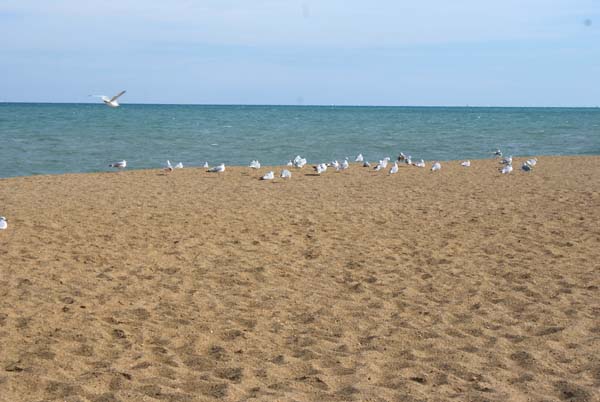



13 Ways of Looking at Some Polyps
Donal Mahoney
He asked and so I told him.
The “cancer” poems stem
from cancer in the family.
Daughter’s terminal.
Son’s a five-year survivor.
Mother died at 59.
I had 13 polyps, all benign,
snipped a year ago.
I go back next month
for another roto-rooter.
As one grows older,
neighbors, friends and folks
one doesn’t know
die from it.
That’s life, isn’t it.
One never knows
but the question’s not
“Why me?”
The question is
“Why not me?”
Think about it.
We’ll all pop something
now or when, won’t we.
|

Donal Mahoney bio
Nominated for Best of the Net and the Pushcart Prize, Donal Mahoney, a product of Chicago, lives in exile now in St. Louis, Missouri. His fiction and poetry have appeared in various publications, including The Wisconsin Review, The Kansas Quarterly, The South Carolina Review, The Christian Science Monitor, The Chicago Tribune and Commonweal. Some of his online work can be found at http://eyeonlifemag.com/the-poetry-locksmith/donal-mahoney-poet.html#sthash.OSYzpgmQ.dpbs=
|



Ringing in the Ears
Donal Mahoney
Ringing in the ears
has no cure.
It’s called tinnitus
and you can pronounce it
the way it looks or the way
your doctor says it.
Today I discovered how
to turn the ringing off
and that’s to take
a phone call from your son
who says your daughter
died last night.
She won the first
and second match but
lost the last to cancer.
An hour later you realize
the ringing in your ears
has stopped but there’s
no silence in its wake.
A train of memories
chugs by and stops
and then chugs on again.
You want the ringing
in your ears back again.
You can live with that.
|

Donal Mahoney bio
Nominated for Best of the Net and the Pushcart Prize, Donal Mahoney, a product of Chicago, lives in exile now in St. Louis, Missouri. His fiction and poetry have appeared in various publications, including The Wisconsin Review, The Kansas Quarterly, The South Carolina Review, The Christian Science Monitor, The Chicago Tribune and Commonweal. Some of his online work can be found at http://eyeonlifemag.com/the-poetry-locksmith/donal-mahoney-poet.html#sthash.OSYzpgmQ.dpbs=
|



Coffee with Mr. Conscience
Donal Mahoney
There are a lot of people like me
neither rich nor poor, idling
in the middle who have never wanted
for anything in our lives.
We were reared by parents
who fed us and sent us to school.
We graduated and found jobs
and then moved on to better ones.
We raised families of our own.
We have pensions now
and can pay our bills.
We can buy a new recliner
when the old one breaks.
Which is why I hate to stop
for coffee at Pete’s Diner
and find Mr. Conscience there
sipping his and waiting to ask me
what I’ve done for the poor lately.
He’s an old caseworker who
worked in the projects until retirement.
He volunteers now with a group that
caulks the gaps public grants don’t cover.
He never gives me a moment’s peace,
always after me to help a needy person.
He’ll take cash or a check, isn’t fussy.
He’s Mr. Conscience and he drives me nuts.
But I wouldn’t have coffee with anyone else.
|

Donal Mahoney bio
Nominated for Best of the Net and the Pushcart Prize, Donal Mahoney, a product of Chicago, lives in exile now in St. Louis, Missouri. His fiction and poetry have appeared in various publications, including The Wisconsin Review, The Kansas Quarterly, The South Carolina Review, The Christian Science Monitor, The Chicago Tribune and Commonweal. Some of his online work can be found at http://eyeonlifemag.com/the-poetry-locksmith/donal-mahoney-poet.html#sthash.OSYzpgmQ.dpbs=
|



Systemically Sedated
Marc Livanos a/k/a Panhandle Poet
The El Faro was a rare example
of a steam-powered vessel.
She lumbered out of Jacksonville
with a crew of 33 on 9/30/15.
Tropical storm Joaquin
was already a full-blown hurricane
when El Faro set sail
and quickly became a CAT-4.
Former crew said the “rust bucket
was not supposed to be on the water.”
The ship was covered with rust and its decks
filled with holes as recently as August.
Built in nineteen seventy-five,
El Faro was far beyond
the normal 20-year life span
of an ocean-going vessel.
Yet, the American flagged, built
and crewed vessel was cleared by
the American Bureau of Shipping in February
and the U.S. Coast Guard in June.
From day one, the ten
licensed officers and Captain
knew they sailed in peril
but their hands were tied.
Landlubbers that haven’t lived
the life of a mariner are clueless.
No different than whites that haven’t lived
with police overreach.
One can’t understand
what one hasn’t lived
be it landlubber, mariner,
black or white.
The day El Faro departed Jacksonville,
the third mate told the Captain
that by 4:00 AM, they would be 22 miles
from the center of Joaquin.
At 5:43 AM, the Captain was told
the number 3 hold was flooding.
At 6:13 AM, the ship lost power
and was being slammed by 40' waves.
Fighting these monsters
on a listing rust bucket
makes your hair stand on end.
I know. I fought such monsters.
At 7:29 AM, the Captain trembling
announces “The bow is down...
abandon ship.”
Davey Jones Locker claimed 33 souls.
Unbelievable, TOTE Marine said
“There was no incentive
for the Captain to maintain
the ship’s schedule...”
A master that does not maintain schedule,
even in the face of dangerous conditions,
is usually replaced. This industry practice
goes back too many decades to be denied.
Ask retired captains in the union halls
how the Master must make schedule,
come hell or high water.
Ask the wives and sons and daughters.
But don’t ask the U.S. Coast Guard
or American Bureau of Shipping.
Don’t expect policing organizations
to see or address systemic issues.
|




Storm at the Pier, painting by Patrick Fealey








only choice
is to build
Janet Kuypers
started 12/28/16, finished 1/2/17
walking through ruins
she saw desolation
she saw people saddened
ashes over everything
she walked through the rubble
reached her hand in
pulled out one brick
dusted it off
everyone was saddened
everything was ruined
she saw this brick
and thought
what can I build
*
you think it’s over
but this is your chance
let’s start anew
let’s start from scratch
let’s make the world
as we
see it could be
|

 View or download the free PDF chapbook
View or download the free PDF chapbook
Beginning Anew
with her 2017 poems “only choice is to build”, “our futures”, “Evolving, Connecting and Confounding”, and “optimizing your odds” performed in her 1/7/17 show.
|



See YouTube video of Janet Kuypers in her 1/7/17 show “Beginning Anew” at “New Year, New Poems” in Austin reading her poems “only choice is to build”, “our futures”, “Evolving, Connecting and Confounding”, and “optimizing your odds” to live guitar (from a Canon Power Shot camera).
|

 See YouTube video of Janet Kuypers in her 1/7/17 show “Beginning Anew” at “New Year, New Poems” in Austin reading her poems “only choice is to build”, “our futures”, “Evolving, Connecting and Confounding”, and “optimizing your odds” to live guitar (filmed from a Sony camera).
See YouTube video of Janet Kuypers in her 1/7/17 show “Beginning Anew” at “New Year, New Poems” in Austin reading her poems “only choice is to build”, “our futures”, “Evolving, Connecting and Confounding”, and “optimizing your odds” to live guitar (filmed from a Sony camera).
|

 
See YouTube video 1/8/17 of Janet Kuypers reading her 3 poems “only choice is to build”, “our futures” and “Evolving, Connecting and Confounding” into each other w/ John on acoustic guitar live at Austin’s Kick Butt Poetry (from a Canon Power Shot camera).
|

 
See YouTube video 1/8/17 of Janet Kuypers reading her 3 poems “only choice is to build”, “our futures” and “Evolving, Connecting and Confounding” into each other w/ John on acoustic guitar live at Austin’s Kick Butt Poetry (video from a Sony camera).
|



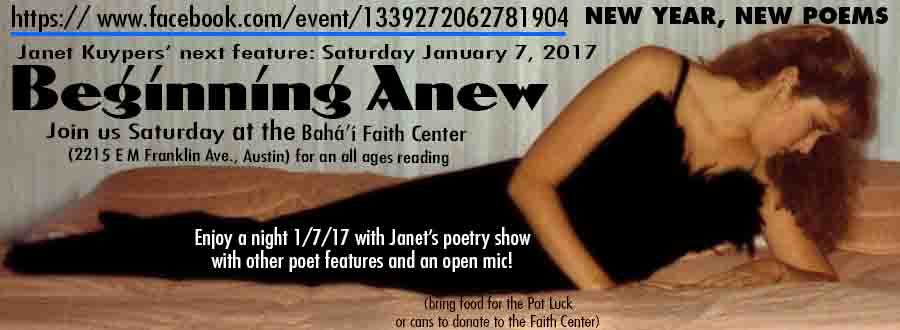
our futures
Janet Kuypers
1/3/17
When the world lays in rubble and everything’s gone,
get out the bulldozers and haul out the trash —
because I’m here to tell you we’re starting anew,
so stop asking for things and start working for things...
it’s time to make choices and it’s time to lay claim
to everything we’ve been blindly giving away
‘cuz you know it’s now time to get it all back —
take it in to your hands, people, mold your own tools.
If you’re scared of someone taking charge in this country,
take charge of yourself, and I’ll take change of me —
because only when we define our role in the future
will we see the future we want, and the future we need.
We can let others define our futures for us,
or we can spread the word, and we can make the difference.
|

 View or download the free PDF chapbook
View or download the free PDF chapbook
Beginning Anew
with her 2017 poems “only choice is to build”, “our futures”, “Evolving, Connecting and Confounding”, and “optimizing your odds” performed in her 1/7/17 show.
|



See YouTube video of Janet Kuypers in her 1/7/17 show “Beginning Anew” at “New Year, New Poems” in Austin reading her poems “only choice is to build”, “our futures”, “Evolving, Connecting and Confounding”, and “optimizing your odds” to live guitar (from a Canon Power Shot camera).
|

 See YouTube video of Janet Kuypers in her 1/7/17 show “Beginning Anew” at “New Year, New Poems” in Austin reading her poems “only choice is to build”, “our futures”, “Evolving, Connecting and Confounding”, and “optimizing your odds” to live guitar (filmed from a Sony camera).
See YouTube video of Janet Kuypers in her 1/7/17 show “Beginning Anew” at “New Year, New Poems” in Austin reading her poems “only choice is to build”, “our futures”, “Evolving, Connecting and Confounding”, and “optimizing your odds” to live guitar (filmed from a Sony camera).
|

 
See YouTube video 1/8/17 of Janet Kuypers reading her 3 poems “only choice is to build”, “our futures” and “Evolving, Connecting and Confounding” into each other w/ John on acoustic guitar live at Austin’s Kick Butt Poetry (from a Canon Power Shot camera).
|

 
See YouTube video 1/8/17 of Janet Kuypers reading her 3 poems “only choice is to build”, “our futures” and “Evolving, Connecting and Confounding” into each other w/ John on acoustic guitar live at Austin’s Kick Butt Poetry (video from a Sony camera).
|



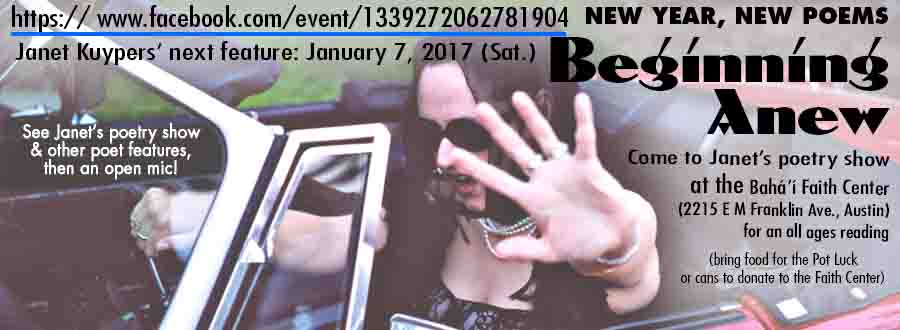
Evolving, Connecting and Confounding
Janet Kuypers
started 12/28/16, finished 1/2/17
It concerns me when I see toddlers vying for their mommy’s attention, yelling, to get their mom to look up from their smart phone.
It confuses me when I hear that IBM corp., the company that invented the P.C., has decided that all their employees should use Macintosh computers. Riddle me this, Batman, explain to me why the new decree is that all IBM employees should use Macs.
It condemns us all when I see an ad on TV of a hero fighting enemies, killing people, escaping certain doom before saving humanity — until the PlayStation logo appears, followed by the words “Greatness Awaits.”
How confounding. Because greatness awaits for those who didn’t sit on those comfy cushions and play video games. Heroes act, they don’t sit back and escape their reality by playing games of an alternate reality — they make their lives great. So, yes, for all you console junkies, greatness still awaits.
It consumes me when the town I am from, the city I love, the one with the best architecture, the best skyline from the water, and wait a minute, the best tasting tap water too, the best blues music, the best cultural mix, it consumes my soul when the mayor calls Chicago a sanctuary city and further restricts gun rights of those who would legally buy guns. Unlike the gangs, who, in Chicago over Christmas weekend, shot over 60 people.
Of course there were innocent bystanders.
It concerns me. It confuses me. It confounds me. It consumes me.
This is commonplace. This is a part of what they call evolution. Or maybe it’s how the culture evolves, by staring at screens with all the surface information they could ever want at their fingertips. Or maybe it’s how the culture devolves, by not having to remember a thing (because you always have Google on that phone of yours that’s smarter than you), so you can just stare at a screen instead of interacting with people.
Because why would you want to interact with people when you can look at a 4 inch square screen instead.
Went to a bar and saw two men together at a table, both using their smart phones instead of interacting with each other. (But wait a minute, isn’t the point of going out in public to meet someone in the first place, isn’t the point to actually interact with them?)
Because the bar, the pub, the publican, was a place where people went to meet up with each other to interact. But this past New Year’s Eve, at a bar on Rainey street, a group of people went into a bar to ask if they had TVs, so they could watch a sports game. You see, now this publican is becoming a place where people can all go to pay attention to anything other than the people they came with — or anyone else, for that matter. This is your new future.
‘Cuz I remember back in the day when me and my friend Jason had our laptops at a bar with a bunch of friends, and we could transfer files to each other by putting our laptop sensors in front of each other. So yeah, I was still doing computer geek stuff, but at least I was in public, interacting with actual people, while I did it. This is how we were cutting edge, and this is how we were rebellious. All without losing our connection to people.
We look for a happy medium. I am the woman who uses audio and video sampling in my performances, the woman with her own name name as a domain name, tons of CDs on iTunes, who runs a expansive online and print publishing organization incorporating YouTube and Vine videos, facebook, twitter, instagram, even Pintrest, Tumblr and Google+. But I don’t know how many times I’ve been called a luddite because I only recently got a smart phone, and you know, no one ever calls me, so really, what am I missing out on.
Because maybe the problem is trying to come up with that balance. With the ever-expanding technology crammed down our throats that we’re forced to feel that we need, sure, we can always want the latest and the newest, we can forget that our phone used to cost less that $20 per household per month, because we always have to give up something to get something more.
We think we can have it both ways as we welcome the new millennium, but maybe the real key to it all is remembering to strike that balance, so we don’t lose what we loved about the past, while embracing and throwing our arms around the future.
The future is ours. Just look before you leap, so you know that you’ll land on your own two feet — and still land on top.
|

 View or download the free PDF chapbook
View or download the free PDF chapbook
Beginning Anew
with her 2017 poems “only choice is to build”, “our futures”, “Evolving, Connecting and Confounding”, and “optimizing your odds” performed in her 1/7/17 show.
|



See YouTube video of Janet Kuypers in her 1/7/17 show “Beginning Anew” at “New Year, New Poems” in Austin reading her poems “only choice is to build”, “our futures”, “Evolving, Connecting and Confounding”, and “optimizing your odds” to live guitar (from a Canon Power Shot camera).
|

 See YouTube video of Janet Kuypers in her 1/7/17 show “Beginning Anew” at “New Year, New Poems” in Austin reading her poems “only choice is to build”, “our futures”, “Evolving, Connecting and Confounding”, and “optimizing your odds” to live guitar (filmed from a Sony camera).
See YouTube video of Janet Kuypers in her 1/7/17 show “Beginning Anew” at “New Year, New Poems” in Austin reading her poems “only choice is to build”, “our futures”, “Evolving, Connecting and Confounding”, and “optimizing your odds” to live guitar (filmed from a Sony camera).
|

 
See YouTube video 1/8/17 of Janet Kuypers reading her 3 poems “only choice is to build”, “our futures” and “Evolving, Connecting and Confounding” into each other w/ John on acoustic guitar live at Austin’s Kick Butt Poetry (from a Canon Power Shot camera).
|

 
See YouTube video 1/8/17 of Janet Kuypers reading her 3 poems “only choice is to build”, “our futures” and “Evolving, Connecting and Confounding” into each other w/ John on acoustic guitar live at Austin’s Kick Butt Poetry (video from a Sony camera).
|



See YouTube video of Janet Kuypers 1/21/17 reading her poems “The Truth Is Out There”, “Evolving, Connecting and Confounding”, and “Saving Fingers and Scooping Ice Cream” at the “Poetry Aloud” open mic at the Georgetown Public Library (from a Canon Power Shot camera).
|



See YouTube video of Janet Kuypers 1/21/17 reading her poems “The Truth Is Out There”, “Evolving, Connecting and Confounding”, and “Saving Fingers and Scooping Ice Cream” at the “Poetry Aloud” open mic at the Georgetown Public Library (this video was filmed from a Sony camera).
|

 

See YouTube video 6/11/17 of Janet Kuypers reading her poems “Tapes the Key Hole”, “Evolving, Connecting and Confounding” and “How Much For Your Poem” at Georgetown’s “Poetry Aloud” open mic (Sony).
|

 

See YouTube video 6/11/17 of Janet Kuypers reading her poems “Tapes the Key Hole”, “Evolving, Connecting and Confounding” and “How Much For Your Poem” at Georgetown’s “Poetry Aloud” open mic (Lumix).
|




optimizing your odds
Janet Kuypers
1/3/17
When bad news comes, do you run away.
After a life threatening blow, do you just give up.
Or do you smile, and find a away to get ahead.
*
My friend Warren, bless his soul, he’d play songs
I wanted to cover in our band, and not just more
Stevie Ray Vaughan. He’d drive in a car with me
for three hours to be be in a radio show interview.
He’d play guitar at my wedding. And when
my friend Warren, bless his soul, contracted ALS,
his smile never faded. He’d go on group walks
to get money to look for a cure, and even when
the ALS intensified and his muscles failed him
they got him a wheelchair and a voice box
so his thoughts could sound like Stephen Hawking.
His high school even planned their reunion
at his favorite bar, and at McDivot’s the women
still flocked to him, and not skipping a beat,
Warren would still flatter every woman he saw
with his Stephen Hawking voice, and everyone
that night left happier, just for knowing him.
His desire to live, and more importantly,
his friendly demeanor, made every uphill battle
seem like a it was no effort at all,
even like you were seated, leaning back,
and letting the wheels take you anywhere
you needed to go.
*
And every single one of us, all of our lives,
are never prepared for the struggles we face.
But I have learned, and you can too,
that we can still win over impossible odds.
And sometimes, sometimes we don’t have control.
But it’s the same thing as driving a car,
of letting those wheels take you
where you need to go.
We don’t know how all the gears work in that car,
but we trust it, and we have the same trust
as every other driver on the road.
And sometimes, sometimes we give up control,
knowing it’s for the best. We get on an airplane
and trust the pilot, we sit in our seats,
insert the seat belt latch ‘til it clicks us in,
place our seats into an upright and locked position
and give up control. Even for us control freaks,
we know we can’t do everything on our own.
And lucky for us — once we give up a little
control, well, look at all the places we can go.
|

 View or download the free PDF chapbook
View or download the free PDF chapbook
Beginning Anew
with her 2017 poems “only choice is to build”, “our futures”, “Evolving, Connecting and Confounding”, and “optimizing your odds” performed in her 1/7/17 show.
|



See YouTube video of Janet Kuypers in her 1/7/17 show “Beginning Anew” at “New Year, New Poems” in Austin reading her poems “only choice is to build”, “our futures”, “Evolving, Connecting and Confounding”, and “optimizing your odds” to live guitar (from a Canon Power Shot camera).
|

 See YouTube video of Janet Kuypers in her 1/7/17 show “Beginning Anew” at “New Year, New Poems” in Austin reading her poems “only choice is to build”, “our futures”, “Evolving, Connecting and Confounding”, and “optimizing your odds” to live guitar (filmed from a Sony camera).
See YouTube video of Janet Kuypers in her 1/7/17 show “Beginning Anew” at “New Year, New Poems” in Austin reading her poems “only choice is to build”, “our futures”, “Evolving, Connecting and Confounding”, and “optimizing your odds” to live guitar (filmed from a Sony camera).
|

 
See YouTube video 1/8/17 of Janet Kuypers reading her 3 poems “only choice is to build”, “our futures” and “Evolving, Connecting and Confounding” into each other w/ John on acoustic guitar live at Austin’s Kick Butt Poetry (from a Canon Power Shot camera).
|

 
See YouTube video 1/8/17 of Janet Kuypers reading her 3 poems “only choice is to build”, “our futures” and “Evolving, Connecting and Confounding” into each other w/ John on acoustic guitar live at Austin’s Kick Butt Poetry (video from a Sony camera).
|

 

See YouTube video live 1/21/17 of Janet Kuypers reading her poems “The Truth Is Out There”, “Barbie” and “optimizing your odds” at “Recycled Reads” open mic, at a book store affiliated with the Austin Public Library (this video was filmed from a Sony camera).
|

 

See YouTube video live 1/21/17 of Janet Kuypers reading her poems “The Truth Is Out There”, “Barbie” and “optimizing your odds” at “Recycled Reads” open mic, at a book store affiliated with the Austin Public Library (this video filmed from a Canon Power Shot camera).
|

 

See YouTube video from 4/9/17 of Janet Kuypers reading a portion of her short story “Crazy”, then reading her poems “Tall Man”, “There I Sit” and “Optimizing your Odds” at “Kick Butt Poetry” in Austin (from a Canon Power Shot SX700 camera).
|

 

See YouTube video from 4/9/17 of Janet Kuypers reading a portion of her short story “Crazy”, then reading her poems “Tall Man”, “There I Sit” and “Optimizing your Odds” at “Kick Butt Poetry” in Austin (this video was filmed from a Sony camera).
|
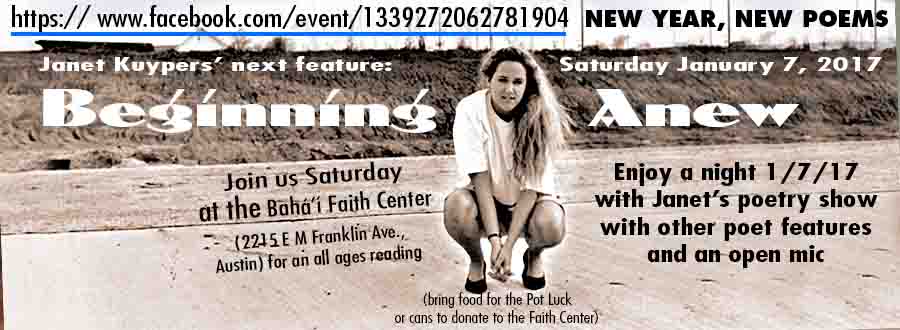

|
Janet Kuypers has a Communications degree in News/Editorial Journalism (starting in computer science engineering studies) from the UIUC. She had the equivalent of a minor in photography and specialized in creative writing. A portrait photographer for years in the early 1990s, she was also an acquaintance rape workshop facilitator, and she started her publishing career as an editor of two literary magazines. Later she was an art director, webmaster and photographer for a few magazines for a publishing company in Chicago, and this Journalism major was even the final featured poetry performer of 15 poets with a 10 minute feature at the 2006 Society of Professional Journalism Expo’s Chicago Poetry Showcase. This certified minister was even the officiant of a wedding in 2006.
She sang with acoustic bands “Mom’s Favorite Vase”, “Weeds and Flowers” and “the Second Axing”, and does music sampling. Kuypers is published in books, magazines and on the internet around 9,300 times for writing, and over 17,800 times for art work in her professional career, and has been profiled in such magazines as Nation and Discover U, won the award for a Poetry Ambassador and was nominated as Poet of the Year for 2006 by the International Society of Poets. She has also been highlighted on radio stations, including WEFT (90.1FM), WLUW (88.7FM), WSUM (91.7FM), WZRD (88.3FM), WLS (8900AM), the internet radio stations ArtistFirst dot com, chicagopoetry.com’s Poetry World Radio and Scars Internet Radio (SIR), and was even shortly on Q101 FM radio. She has also appeared on television for poetry in Nashville (in 1997), Chicago (in 1997), and northern Illinois (in a few appearances on the show for the Lake County Poets Society in 2006). Kuypers was also interviewed on her art work on Urbana’s WCIA channel 3 10 o’clock news.
She turned her writing into performance art on her own and with musical groups like Pointless Orchestra, 5D/5D, The DMJ Art Connection, Order From Chaos, Peter Bartels, Jake and Haystack, the Bastard Trio, and the JoAnne Pow!ers Trio, and starting in 2005 Kuypers ran a monthly iPodCast of her work, as well mixed JK Radio — an Internet radio station — into Scars Internet Radio (both radio stations on the Internet air 2005-2009). She even managed the Chaotic Radio show (an hour long Internet radio show 1.5 years, 2006-2007) through BZoO.org. She has performed spoken word and music across the country - in the spring of 1998 she embarked on her first national poetry tour, with featured performances, among other venues, at the Albuquerque Spoken Word Festival during the National Poetry Slam; her bands have had concerts in Chicago and in Alaska; in 2003 she hosted and performed at a weekly poetry and music open mike (called Sing Your Life), and from 2002 through 2005 was a featured performance artist, doing quarterly performance art shows with readings, music and images. Starting at this time Kuypers released a large number of CD releases currently available for sale at iTunes or amazon, including “Across the Pond”(a 3 CD set of poems by Oz Hardwick and Janet Kuypers with assorted vocals read to acoustic guitar of both Blues music and stylized Contemporary English Folk music), “Made Any Difference” (CD single of poem reading with multiple musicians), “Letting It All Out”, “What we Need in Life” (CD single by Janet Kuypers in Mom’s Favorite Vase of “What we Need in Life”, plus in guitarist Warren Peterson’s honor live recordings literally around the globe with guitarist John Yotko), “hmmm” (4 CD set), “Dobro Veče” (4 CD set), “the Stories of Women”, “Sexism and Other Stories”, “40”, “Live” (14 CD set), “an American Portrait” (Janet Kuypers/Kiki poetry to music from Jake & Haystack in Nashville), “Screeching to a Halt” (2008 CD EP of music from 5D/5D with Janet Kuypers poetry), “2 for the Price of 1” (Janet Kuypers poetry to music from Peter Bartels), “the Evolution of Performance Art” (13 CD set), “Burn Through Me” (Janet Kuypers poetry to music from The HA!Man of South Africa), “Seeing a Psychiatrist” (3 CD set), “The Things They Did To You” (Janet Kuypers poetry to music from the DMJ Art Connection), “Hope Chest in the Attic” (audio CD set), “St. Paul’s” (3 CD set), “the 2009 Poetry Game Show” (3 CD set), “Fusion” (Janet Kuypers poetry in multi CD set with Madison, WI jazz music from the Bastard Trio, the JoAnne Pow!ers Trio, and Paul Baker), “Chaos In Motion” (tracks from Internet radio shows on Chaotic Radio), “Chaotic Elements” (audio CD set for the poetry collection book and supplemental chapbooks for The Elements), “etc.” audio CD set, “Manic Depressive or Something” (Janet Kuypers poetry to music from the DMJ Art Connection), “Singular”, “Indian Flux” (Janet Kuypers poetry to music from the DMJ Art Connection), “The Chaotic Collection #01-05”, “The DMJ Art Connection Disc 1” (Janet Kuypers poetry to music from the DMJ Art Connection), “Oh.” audio CD, “Live At the Café” (3 CD set), “String Theory” (Janet Kuypers reading other people's poetry, with music from “the DMJ Art Connection), “Scars Presents WZRD radio” (2 CD set), “SIN - Scars Internet News”, “Questions in a World Without Answers”, “Conflict • Contact • Control”, “How Do I Get There?”, “Sing Your Life”, “Dreams”, “Changing Gears”, “The Other Side”, “Death Comes in Threes”, “the final”, “Moving Performances”, “Seeing Things Differently”, “Live At Cafe Aloha”, “the Demo Tapes” (Mom’s Favorite Vase), “Something Is Sweating” (the Second Axing), “Live In Alaska” EP (the Second Axing), “the Entropy Project”, “Tick Tock” (with 5D/5D), “Six Eleven”
“Stop. Look. Listen.”, “Stop. Look. Listen to the Music” (a compilation CD from the three bands “Mom’s Favorite Vase”, “Weeds & Flowers” and “The Second Axing”), and “Change Rearrange” (the performance art poetry CD with sampled music).
From 2010 through 2015 Kuypers also hosted the Chicago poetry open mic the Café Gallery, while also broadcasting weekly feature and open mic podcasts that were also released as YouTube videos.
In addition to being published with Bernadette Miller in the short story collection book Domestic Blisters, as well as in a book of poetry turned to prose with Eric Bonholtzer in the book Duality, Kuypers has had many books of her own published: Hope Chest in the Attic, The Window, Close Cover Before Striking, (woman.) (spiral bound), Autumn Reason (novel in letter form), the Average Guy’s Guide (to Feminism), Contents Under Pressure, etc., and eventually The Key To Believing (2002 650 page novel), Changing Gears (travel journals around the United States), The Other Side (European travel book), the three collection books from 2004: Oeuvre (poetry), Exaro Versus (prose) and L’arte (art), The Boss Lady’s Editorials, The Boss Lady’s Editorials (2005 Expanded Edition), Seeing Things Differently, Change/Rearrange, Death Comes in Threes, Moving Performances, Six Eleven, Live at Cafe Aloha, Dreams, Rough Mixes, The Entropy Project, The Other Side (2006 edition), Stop., Sing Your Life, the hardcover art book (with an editorial) in cc&d v165.25, the Kuypers edition of Writings to Honour & Cherish, The Kuypers Edition: Blister and Burn, S&M, cc&d v170.5, cc&d v171.5: Living in Chaos, Tick Tock, cc&d v1273.22: Silent Screams, Taking It All In, It All Comes Down, Rising to the Surface, Galapagos, Chapter 38 (v1 and volume 1), Chapter 38 (v2 and Volume 2), Chapter 38 v3, Finally: Literature for the Snotty and Elite (Volume 1, Volume 2 and part 1 of a 3 part set), A Wake-Up Call From Tradition (part 2 of a 3 part set), (recovery), Dark Matter: the mind of Janet Kuypers , Evolution, Adolph Hitler, O .J. Simpson and U.S. Politics, the one thing the government still has no control over, (tweet), Get Your Buzz On, Janet & Jean Together, po•em, Taking Poetry to the Streets, the Cana-Dixie Chi-town Union, the Written Word, Dual, Prepare Her for This, uncorrect, Living in a Big World (color interior book with art and with “Seeing a Psychiatrist”), Pulled the Trigger (part 3 of a 3 part set), Venture to the Unknown (select writings with extensive color NASA/Huubble Space Telescope images), Janet Kuypers: Enriched, She’s an Open Book, “40”, Sexism and Other Stories, the Stories of Women, Prominent Pen (Kuypers edition), Elemental, the paperback book of the 2012 Datebook (which was also released as a spiral-bound cc&d ISSN# 2012 little spiral datebook, , Chaotic Elements, and Fusion, the (select) death poetry book Stabity Stabity Stab Stab Stab, the 2012 art book a Picture’s Worth 1,000 words (available with both b&w interior pages and full color interior pages, the shutterfly ISSN# cc& hardcover art book life, in color, Post-Apocalyptic, Burn Through Me, Under the Sea (photo book), the Periodic Table of Poetry, a year long Journey, Bon Voyage!, and the mini books Part of my Pain, Let me See you Stripped, Say Nothing, Give me the News, when you Dream tonight, Rape, Sexism, Life & Death (with some Slovak poetry translations), Twitterati, and 100 Haikus, that coincided with the June 2014 release of the two poetry collection books Partial Nudity and Revealed.
|







All Things Must Pass
Charles Hayes
Every hour from morning until night the loud raspy sound of the buzzer would reverberate through the ward. That meant it was time to line up in front of the heavy locked door for a cigarette break. The ward I was on was located on the third floor of a brick building that stood among many similar buildings spread out over hundreds of acres. Reinforced screens were on all the windows, making sure that there was no way in nor out except through the door where the cigarette line began to form. Immediately on the other side of the door and off the hall was the smoke room.
It was the buzzer that woke me that first morning at the state hospital. I could remembered how I got there—no one could forget that—but I couldn’t remember exactly what had happened when I arrived. All I could recall was that it had been very dark and that I had been taken into the ground floor of a building that had no lights except for a couple of pale yellow ones that lit the room where I entered. There had been some white coats with a needle who apparently had given me a shot while the cops removed the leg chains. Now there were all these people lined up in the hall outside my room. Besides the one I was in, there were six other beds in the room, all vacant and made up. I was the only one still there.
The entry into the room was without a door so I could see quite clearly the people in the hall. They were all male, a mixture of young and old, big and small. Some were dressed in hospital gowns and others in plain street clothes, holding their cigarettes and ready for fire, since patients were forbidden to have matches or lighters.
One of the aides, a young woman, entered my room and asked me if I smoked. She told me that if I did, now was the time to line up for the break. Having no cigarettes and too worried to care I replied that I was out of smokes and guessed that I was going to quit. She offered me a couple of hers and when I refused she insisted, so I took the cigarettes and any thoughts of quitting were quickly forgotten. Not dissimilar from the Marine Corps, smoking was encouraged as a means to exert further control over the patients. Shortly after I took the cigarettes and got in line, the door was unlocked and we were allowed out and into the smoking room to smoke as many cigarettes as we wished in the next ten or fifteen minutes. It was one of the big deals of the ward. Another big deal was meal time, when the same procedure was followed except instead of going in the smoke room we would be shuttled down in the key operated elevator and then herded as a group out of the building and over to another building that housed the cafeteria. After we had eaten, the process would be reversed.
The food was not bad. Better than the marines and what I was able to cook up at home. That first day I was allowed to make a phone call back to Fox Run, get a hold of Jeff, and ask him to feed the dogs until I could get back. We had stacked some cases of beer over the fence at my shack and I told Jeff to take it in return for his help. After that was agreed to the major worry about my dogs was partially lifted. I had no idea what was coming next or how long I would be there and no information was provided by the staff. I quickly found out that taking stock of what I could observe was the best way to learn things around there.
The process of getting through the withdrawal and shock of the first few days was structured so that the pills came regularly. That was also done in long lines where one filed up to a split door with a dispensing shelf on the bottom half and the top half fully open. The medication had to be taken at the door and the staff checked to see that it was and not hidden somewhere to stockpile for a later suicide.
I learned that the guys in hospital gowns were the ones that found it hard to get out of bed after being medicated. A guy a little younger than me was next to me in line. The same height with an athletic build and long wavy brown hair over clear intelligent eyes, except for the blue gown, he could have been almost any young college student. From a small town not far away, there in the Kanawha Valley, he was friendly in a mild sort of way. I found him much easier to talk to than many of the so-called normal people that I had met in my life. He told me that he had been there two years and really didn’t like it. The medicine was hard for him to tolerate and made him feel like he wasn’t all there. All he wanted was to go home, but so far there hadn’t been a hint that that was going to happened. Clearly depressed about it all, he still managed to smile some. When we got to the medicine counter I saw that he was given a large dose of liquid Haldol, a major anti-psychotic drug. I just got the normal detox stuff which was just a sedative of one kind or another. That was all the aide giving the medicine would tell me. I still hadn’t seen a doctor or a therapist so I only had the fact that I didn’t get knocked out to go by.
About an hour and a half later I saw the same guy that I had been next to in line coming toward me down the hall with a gait that looked a little strange, sort of stiff and mechanical. I figured that the guy was just showing recognition with a little skit like some people do when they see someone they know. But as we passed and I was about to greet him the guy’s eyes told a different story. They were vacant and saw nothing. Where they had been clear and intelligent before they were now cloudy and fixed. I just stood there and watched him pass by looking like something out of Frankenstein. It was not the same young man that I had spoken with a short while before. That man was gone and in his place was this medical model that no one would know. A few days later coming back from the cafeteria, which was right before meds, the same young man made a run for it and made it over an embankment into the woods before anyone could stop him. A few days later he was back after being apprehended by the sheriff in his home town. I would look in the door of his room sometimes and always he was sleeping. How he ate was a puzzle to me and the whole thing smacked of injustice. I began to keep a journal.
The other occupants of my room were drinkers also and about the same age as me. Seems that all the drinkers were housed in that one room while the other psychiatric patients were housed in other rooms throughout the ward. The treatment program for the drinkers was a 28 day process and always full so when one class would finish another would start. That’s when the people in my room could expect to move to new housing. When I finally saw a treatment team I found out that it consisted of three people, a doctor, a psychologist, and a social worker. They tried unsuccessfully to diagnosis me, so the doctor put me on three different kinds of pills. I figured that they were shot gunning me with multiple meds to cover a broad range of disorders. I was not happy about it and could see that the process was thoroughly lacking in anything that could get me moved along and out of there. The pills caused me to nap often and it was during one of those naps that I had one of my nightmares. The dream was about being back on the bunker lines in the Nam and under attack by the VC. I was terrified, alone and out of ammunition as a single VC casually walked toward me with his AK-47 at the ready. I wanted to scream for help but no sound would come out of my mouth. The VC just kept coming forward with that determined look that said I was dead. The more I tried to scream the worse it got. There was nothing I could do about it but still I continued to furiously struggle with the attempt to make some sound. The VC walked up to the edge of the bunker, looked down at me with a face that showed very little, and aimed his AK at my head. Knowing that I was going to die the scream finally burst loose in a long wail. As I jerked awake and sat up on the bed I saw the young male aide, who had shaken me awake, jumping back in startled horror. He had wanted to tell me that it was time for meds. His eyes were as big as saucers and he was screaming also. All this happened in just a flash before we both realized what had happened. We just looked at each other. I felt embarrassed and didn’t know what to do so I just laughed and then the young aide laughed. I had scared the shit out of him and apologized. He told me that it was ok, that he would get over it. Then I went to get his meds.
The next time my treatment team saw me they told me that they didn’t think my problem was about alcohol, that I was being classified as a psychiatric case. I figured that if I didn’t have to go through a month long treatment program maybe I could get out of there sooner. This possibility gave me hope.
I tried to stay in shape by doing exercises on the floor in the mornings. Always up before the lights came on I would do my little routine, shower, and get the coffee urn going. I had inherited it from one of my roommates who had gone into alcohol treatment. Most of the patients had a constant craving for caffeine and I could get coffee from the commissary and brew it up then sell it for a dime a cup, making about three bucks a day.
I was adjusting quickly to the loony bin and faithfully keeping my journal. One of the staff saw me writing in it and suspiciously inquired about what I was doing. I just said that I was writing down the things that happened there. The aide, an older woman, just let it go but I could tell that she didn’t like it. It seemed that she was about to stop me but then thought better of it. I had no doubt that the place was a real cuckoo’s nest, better than any Hollywood could ever invent, and to get a script of it was just too much to pass up.
The only therapy that I was exposed to was an arts and crafts class where I painted with watercolors. The others did similar things and for a couple of hours they got their creative fix. I took it in good stride but I could not help feeling the nature of the whole thing, the ultimate in custodial care. There were also lots of escapes, recaptures, and fights with the throwing of chairs and the whole nine yards but most people were so incapacitated that they could only do minimal damage, except for the drinkers. They didn’t get the tough meds like most of the others and they could be very tricky and foxy when it came to little scams here and there to make life more interesting. These events would usually involve an escape to one of the bars in the city just beyond the fences. One of the guys that was in my room got away one day and then simply returned in the middle of the night, drunk and raising hell. They put him in a padded room and he literally raised hell and pounded the door all night long. The guy was not very big and I was amazed at his stamina and strength in his pursuit of communicating to the world how fucked up he thought it was. It reminded me of myself.
This little guy was good with women too. A dance was held once in one of the buildings with a big dance floor where the women and men were allowed to mix. The same guy that had raised hell all night took the woman that I had unsuccessfully tried to warm up and had her talking and laughing in one dance. Or maybe it was because I was just too rigid and this guy was more lighthearted. Being with the women was a very big deal but it was closely monitored and progressed to nothing more than an old fashioned social when it came to any romance.
I met a nice looking woman in arts therapy who knew the daughter of one of the people on Fox Run. They had gone to high school together. The woman seemed happy and well adjusted. She was friendly and sociable and comfortable in her own skin which was a rarity there at the state hospital. Surprisingly, she had been there 15 years and it was her home. I figured that it took all kinds but that kind of home was not for me. Ironically it was the spunky little alcoholic who was good at escapes and with women that showed me the way out. I had never talked to the guy. In fact I kept pretty much to myself and talked very little to anybody but I didn’t miss a whole lot. I suspected that the commitment procedure that had put me there mandated that if I disagreed with my incarceration I was entitled to file a petition that requested a court hearing within 72 hours in order to air my grievance. I had learned that while working at a hospital in another place. But I had also learned that I was supposed to be able to defend myself in the initial commitment. I hadn’t been allowed to say even one word. I had been cuffed and chained.
I began to feel that my rights had been violated as it always seemed to go when dealing with the American legal system—you get what you pay for and I had no money. But neither did the little guy who knew how to play the system. When he got bored with pretending that he was waiting for a treatment opening and wanted to get out of there he filed one of those petitions. I waited and watched to see how they were going to try him but it never happened. Three days later he was freed. I had been there almost two weeks and I wanted out too. So I immediately went to the office and filed the same petition that essentially said that you must let me go or prove you have the right to keep me here. The staff took my application like it was just another kind of treatment modality that was expected to come along at the proper time. Two days later I was called in by my treatment team. This time I did not see the doctor and there were no more pill prescriptions. That was good because I had lately been hiding them under my tongue until I could get out of line and remove them. The psychologist was also a Vietnam Veteran. On one previous occasion we had talked some about it. He had been in the army with the tanks down South. He told me that I would be released the next day and could go if I wanted to, but if I stayed they would help me get veteran’s compensation. He acted like it was a done deal. I wondered why they could do it when I sure as hell couldn’t. But at that point I didn’t care, I just wanted out of there.
Next I saw the social worker who gave me enough money for the bus ticket and a referral to the same local mental health center where I had been before. Next morning I was out of there and on the greyhound to the southern part of the state. Then I called a guy that I knew to take me over the mountains to Fox Run.
It was during the hot part of the summer and the yard was grown up when I got home. When I arrived my dogs came out from under the house where it was cool and greeted me. They seemed fine. Since I had passed the word for the river people to come up there and take whatever they could find, the garden was bare. When I entered the shack I saw that the skillet on the stove was full of maggots from leftover hamburger and that there were dirty dishes scattered about. Pretty dirty all over as usual, but what I noticed most was that it was so quiet. There were no screams nor fights. No crazy people in your face wanting to know why you were doing whatever you were doing. A shack and a little piece of earth nestled in the hot summer Appalachian place known as Fox Run. Without a doubt there would be snakes where the grass was thick. It was a pretty poor place but lovely compared to where I had been. I was home and ready for another run.
|

Charles Hayes bio
Charles Hayes, a multiple Pushcart Prize Nominee, is an American who lives part time in the Philippines and part time in Seattle with his wife. A product of the Appalachian Mountains, his writing has appeared in Ky Story’s Anthology Collection, Wilderness House Literary Review, The Fable Online, Unbroken Journal, CC&D Magazine, Random Sample Review, The Zodiac Review, eFiction Magazine, Saturday Night Reader, Cha: An Asian Literary Journal, Scarlet Leaf Publishing House, Burning Word Journal, eFiction India, and others.
|



Big Wheel
Charles Hayes
I was newly discharged from the military and wanted nothing to do with society at large. Any ambition that I may have had before had died in the military, along with most of my empathy. But I had to eat. After my separation benefits ran out I gave up my rented room and started to drift in and out of the hill country, picking up jobs where I could find them. And with jobs came parts of society. Eventually I came to work for a large farm in the Appalachian foothills where a local girl worked part time. Mostly I worked in the field while she worked in the packing shed. But at our noon meals we sat next to each other. That was the beginning as our eyes talked with our mouths full.
Olivia was a nice small town girl with exceptional looks and an openness, trust, and unchallenged confidence that fit my closed heart and smartly healed scars like a tongue and groove. A couple of years out of high school, she hadn’t been around much and didn’t seem to care. She just couldn’t place herself in the populace of most of her peers, had no desire for a “higher” education, and was reluctant to follow just any beat or hop any wagon just because most others did. In a word she was different. But she was a good person and, though different, held no animosity for the mainstream. She simply chose discriminately when or when not to enter it. And when it came to romance, for one reason or another, I guess she chose to stand at the edge. Perhaps it was her place for further study. However she was more than ready. She came my way easy enough to tell that she was no big fan of the local selection when it came to dating. I considered myself lucky to be around.
In my small cottage that came with the job, Olivia would poke fun at my seeming shyness, not seeing it for the hard edge that it was. Maybe we all see in others those things that make us tick. She liked ‘bringing me all the way out,’ as she put it. It made her feel the primal power of herself, a heady awakening for her young years, I suppose. It was easy to not look for broken things about one another. She couldn’t see the loner in me. She simply wrote off my standoffishness to rebellion. That, along with the few years that I held on her, put her at ease. For a young woman who was tired of being alone I was an easy pick. But she simply missed the real aloofness of my nature, wishfully ascribing it to things that would work out over time and become dependably steady. Though I advised her that I was not that sort of guy, I went at our relationship like no pain could ever come of it. I played into her needs for the most part and allowed them to grow....until she became pregnant.
Near the end of the harvest with the steep hardwoods turning brilliant colors around us, our evening let downs in my cottage subsided a bit. Sensing that my ardor had been sobered some and literally beginning to feel the consequences of our naked romps, Olivia often decided to return to her little studio over the drugstore in the nearby town of Thornton. We still enjoyed being together but the sense of fun and freedom that we had previously enjoyed was absent. And the working season, along with our income, was about to end. I had always planned on simply moving on at that point.
Olivia did not make the usual demands of a mother to be. She thought that was for ‘old’ people. Her lack of bitterness surprised me some, but I thanked my stars just the same. She came from a well off family not far away and, while they were pissed to the gills at me, they did not intend to let her go it alone. She could return home and have the baby. And I could go on being who I was....with just another son of a bitch tag flapping in my wake.
The last time that we were together, clearing out my cottage after getting paid, Olivia was not showing yet.....except when she removed her clothes. Then, the slightest little rise of tummy could be seen....and felt. Her smooth skin under my calloused hand and her bold expression holding mine all seemed part of an erotica that enhanced our coupling, our good bye. The deeper sensations that ran to the new look in Olivia’s eyes, as if she were seeing me in another way, were the things that I was too coarse to see.
Buoyed by our sex and thinking that I should oil this departure with some optimism I looked to Olivia as she lay on the bed staring afar.
“Hey darling, that was great. You’re always great. You’re going to make some lucky guy very happy.”
Continuing to stare and in a voice that was eerily remote, Olivia replied, “You think so, Peter?”
Sensing that this was not about to go where I wanted, I tried again.
“I know so babe. I’ll never forget the times we’ve had. You’re a special lady no doubt.”
Sitting up on the edge of the bed, Olivia started putting her clothes on as if she were somewhere else.
“I suppose I should thank you for saying that, Peter. It seems that you would know, but I just can’t get it out right now.”
“No problem Olivia, my pleasure,” I said with a grin. “I’m sure you already know how nice you are and don’t need me telling you.”
“Why is that, Peter?”
“Because you’ve obviously heard it before.”
Standing to button her blouse, Olivia seemed to inventory the walls of the little cottage.
“I see,” she said.
A little put off and confused by the detached way that Olivia was responding to our split or maybe just plain insulted by her reflection of an attitude that was usually reserved for me, I went on.
“Do you? You act as if I was your first.”
Not moved an iota, Olivia picked up her hand bag, went to the door and opened it. While I sat naked on the bed watching, she looked through me one more time and said, “You were my first. Good bye, Peter.”
Watching the door close and feeling the sudden vacuum, I was at a loss to grasp what had just happened. Or maybe I just pretended ignorance. But I smiled anyway.
I left Thornton on a Greyhound out of the Appalachians to Cleveland and transferred to another bus for Seattle and the emerald glitter of Puget Sound. Through the many hours of passing through the broad expanses of the West and the rugged climbs of mountain ranges so new and high compared to my ancient Appalachians, I sometimes thought of Olivia and the way that she had retreaded me. For this I felt a spark of luck and hoped for her the same.
Jobs were not hard to find in Seattle. A lot of the tech industry was coming north out of California and that was bringing all the side work that usually surrounded it, mostly construction. I got in the laborer’s union and that kept me in work and allowed me to set up with my own little place near the waterfront. It was more expensive than most of the other areas but I was making good money and the supply of nice legs and tight buns was good. All the cruise ships for the inter-island passage up to Alaska would dock near my place and that brought tourists from all over. Many were skirts just looking for a brief hook-up. Hell I lived there, part of the well known waterfront Public Market you might say. But that got old after a few seasons. I was no longer busting the first years of adulthood and I yearned for something a little more. Something more placid and permanent. For the first time I realized that I was going to break thirty and that it wouldn’t hurt to break that barrier with someone to scout the new lay of the land with. As luck, or more likely karma, would have it, that was about the time I met Anna.
Anna, a quiet, unobtrusive 27 year old Pilates instructor, could have been a model. Tall and slender, with the form and definition of an aerobic athlete, she had immigrated from St. Petersburg, Russia when she was 20 along with her husband, a wealthy Russian entrepreneur who was later killed in an auto accident. Anna taught classes at the gym just down the street from my apartment. It kept her grounded and got her out of her skyline digs atop one of the nicer buildings near mine. Other than that Anna led a pretty normal existence, dating occasionally but not often, and shopping daily with the rest of the crowd at the Public Markets nearby. She particularly liked the Fisherman’s Market where huge salmon were literally slung like javelins from one worker to another so the tourists could get a picture. Some of the best seafood in the world was to be had there...for a price. But that was no matter to Anna. Often, afterwards, she would spend time in the bayside park watching the activity on Elliot Bay and nearby Harbor Island with its many piers.
The air was crisp and clean as I stood by the tall American Native totem watching two or three tugs push a huge container ship toward its slip for unlading. The scene reminded me of how ants worked a big piece of food toward a better place to eat. All things hustling to get by. I was tired of it. I needed a break. The city, while it gave me good money, was starting to rub.
Just killing some off time, I looked South for the familiar behemoth of a clear day, Mt. Rainer. That’s when I saw her, groceries at her side, as she sat on a bench and watched the same things as I. Her long blonde locks were tied back in more of a mane than a tail. She was nice! Her color, the hair, the way the light came off them, it was all real, no dye, no pancake. As she stood up, she tipped over one of her grocery bags, spilling a load of fruit over the walk. On the spot in a heartbeat, I began picking up the fruit. Locked by the luster of her pale blue eyes over an amused twist of full lips, I missed the bag a couple of times, sending the fruit back to the sidewalk. She laughed and helped me to finally get things resituated. It was almost slapstick but maybe it broke the melancholy for both of us. I know it did for me. I couldn’t help it, my controlling self seemed to dissolve. I simply spoke.
“You’re beautiful.”
Continuing to smile while she did a quick appraisal, Anna spoke in a voice that had an edge of the colder regions of the earth. Her English was as good as my hill twang, and a perfect match for her cool beauty.
“Thank you,” she said. “I have seen you before, no? What is your name?”
Rarely did I follow in new encounters but somehow Anna’s pale blues held me there. They said it was her place to lead.
“Peter,’ I replied. “I come here all the time. I live just down the block.”
Looking pleased, Anna quickly went on as if there was a clock ticking somewhere, though her manner was calm.
“Ahhh, you live around here,” she said. “What is your last name, Peter?”
“Sinovich. What’s your name?”
As a couple of gulls settled on the grass near us, sensing that more fruit may appear, Anna actually did a quick toe stand, brought her eyes level to mine, reached out, and pressed her palm to my chest. Literally holding my gaze, she said, “Perfect, how wonderful. My name is Anna Katerina, from a spark of Tolstoy and Dostoyevsky. You know them?”
Feeling her warm hand and straight on with her gaze, I watched her pupils expand as she dropped her arm and came back to her heels. Certainly taken, I simply stared at her smile. As her head tilted aside the least bit and the gulls began to call, I finally answered.
“I have heard of them.”
“How nice,” she said, as she turned to her groceries, went into one of the bags and came out with a badly bruised apple that had gotten stepped on during the spill. Holding it toward me she said, “Here Peter Sinovich, break this up for the gulls.”
“I’ll do better than that,” I replied. Going into my pocket for a small buck knife, I cubed up the fruit nicely on the park bench.
As more gulls began to swoop and hover Anna giggled with pleasure.
“Oh my Peter. You are one that is prepared aren’t you? Does that come from living alone?”
Starting to feel the excitement of the drift, I took a piece of the apple, answered in the affirmative, and pitched it high. As it reached its zenith a gull dived and snatched it.
Anna, suddenly a little girl, did a little hop and clapped her hands.
“Good pitch Peter, that’s really humming them,” she said, as if she were at a Mariner’s baseball game. “Is that correct?”
“You got it right, Anna. You do the rest.”
Tickled with awe Anna pitched the rest of the apple pieces to the swooping gulls while I marveled at her grace and fluid movement. It was as close to perfection as I had ever seen.
Our last piece of apple gone, we looked at each other and smiled. After a moment Anna dusted her hands and turned to face me squarely.
“Peter Sinovich, please take that other bag and walk me home. I live in that glass building just across the square. There is an elevator.”
Bending down to pick up the sack, I looked up at Anna.
Holding the other sack to her breast, she was watching me like a character study that she would be tested on later. I gathered the sack but continued to look up at her. She quickly looked to the hovering gulls, shivered with a little giggle and dropped her eyes back to mine. As her cheeks slightly rouged to a small patch of warmth under those cool pools of blue, she smiled and said, “Come Peter, I will give you a tour. I hope you will like it.”
I followed.
That best of all seasons in Seattle was spent with Anna: Mariner’s games at Safeco Field, fast boats to the San Juan Islands and Victoria, Canada, or simple walks along the waterfront. Anna turned the city for me. I cut back on my job and spent much of that time with her up in her apartment that overlooked the bay and the broader Puget Sound. On a clear day the view through the glass walls from her bed held a backdrop of the snow capped Olympics as they stretched up from the edge of the Pacific Ocean. The kitchen was big enough to serve 100 people and Anna took particular pleasure in cooking up her Beef Stroganoff there. Cleaning was no problem. She had both a Russian cook and maid on call but she rarely used them. There was also a quite expansive exercise studio for her Pilates. With her help and instruction I was amazed at what such exercises could do for the body and spirit. And when Anna brought moves of the bedroom to the studio, Nirvana definitely became more than just a name for a band. To say that my horizons grew fit would be an understatement. But as with all else, the glorious Seattle summer had to come to an end.
It was that time in late September when Seattle seemed hung on an edge. Dry and comfortable, no big change as fall fell, but the marine air could again be sensed. All those who were denizens knew that an adieu to the best there was would soon be due.
With the shades fully pulled back and nothing but sky, water and snow capped mountains peaking in, Anna and I lay against the headboard and watched the island ferries come and go. While she finger danced along my inner thigh Anna said in a rather offhanded way, “I’m really going to miss you Peter Sinovich, what will I ever do without you?”
Whenever Anna used both my names I knew something was going on. Something that usually would not be subject to my approval.
“What do you mean,” I said. “Are you going somewhere?”
“Yes,” Anna replied. “I am going to Russia.”
My languid repose suddenly a thing of the past, I bolted upright and stared at her.
“Russia! When? For how long?”
Anna lithely hopped from the bed and moved to the glass, her back turned as the sun washed her. Just the thought of such flesh and grace being gone broke my heart. I pushed for an answer.
“Well!?”
Anna turned and faced me, her look one of study that I had learned to easily recognize. Only this time there was an edge to it that scared me.
“Well, day after tomorrow,” she said. “And for a long time. Maybe for ever.”
“But why? What about us?” I asked.
Anna waved my questions off for a moment but decided to answer.
“I am Russian, Peter Sinovich. Somewhere in your lineage there is a small part of Russia. Good enough for a while. But you are American. There is no us. There never could be. We had a very good season. Now it is time for me to have a Russian. To be a Russian.”
Feeling my first loss like this, I denied what was happening to me.
“You can’t be serious. I can’t believe this.”
“Believe it. You were very good Peter Sinovich. Lucky girls await you, no doubt.”
Being crushed didn’t feel like I thought it did. It was worse.
“Anna,” I said, “I thought that you loved me. Was I a fool?”
Anna seemed to soften a little. That high color came to her cheeks as she replied.
“There are no fools, Peter. Only people who wish to share. I watched you before. I saw that you were good. In the Market, I saw that the women knew. I wanted you too. It was glorious fun. There will be others. They will not waste you. But for us it is over.”
“Really dumped topsy turvy, I was at a big loss of what to say, what to do. It hurt. Maybe I loved Anna. Tragedy struck so quick.
“Anna,” I said, “how could you?”
Anna hiked her hands to her waist, cocked a hip and said, “Oh come on Peter Sinovich, how could you? You’d do it again if you could. Leave it. I have to make arrangements and will be gone tonight. This place is sold and my shipping people will take it over as soon as I’m gone. Please be gone when I get back. And good luck dear heart. You’ll be fine.”
While I stared naked from the bed after her, Anna went into her dressing room. I heard her shower running as I tried to gather my things without winching to inability. A half hour later she appeared dressed to the tens, went to the entry door, and opened it. Looking back and waving with a smile she said, “You were good. Bye Peter Sinovich.”
Watching the door close this time, of all the times, try as I might, I could not smile.
My job gone because I did not pay my union dues, I had to let my nice apartment go. Suddenly I was right back to where I had been when I first came to Seattle. Hanging around the waterfront with no money was not the way to go. After the way Anna ditched me I just didn’t feel like tickling the skirts that cruised the market area. Besides I was starting to get a little long in the tooth and there were younger men who had taken up the spot that I had vacated when Anna came along. Seattle had been nice but I really owed it nothing. I thought of my Appalachians and the land where I was born.
While working maintenance among the many shipyards to get by and surfing the internet at my boarding house, I discovered a job for a class A rough carpenter. Development construction work near my old haunts in the Appalachian foothills. I applied for it online and my experience in the many construction jobs during the Seattle boom must of got me in. They gave me two weeks to get there and said that my tools would be provided. I would be building houses for a big outfit out of the D.C. area. D.C. was beginning to stretch further out toward the beautiful Shenandoah area of Virginia and the rolling humps of the Appalachian region. The site was a stone’s throw from Thornton, my last area of work in that region. Olivia began to play on my mind as I prepared to head back to that area. Knowing now how she must of felt when I left, I squirmed a little at the thought of running into her, not to mention the child.
With my last bit of money I flew cross-country to D.C. and caught a Greyhound over the Blue Ridge Mountains to Harrisonburg, Virginia and the Happy Homes personnel office. They provided a small advance and transportation the last 20 miles east to the job site, along with adequate housing.
Riding to the site through a few small towns, including Thornton, I wondered if Olivia and my kid were still around there. It had been more than 6 years, closer to seven, since I had left. The towns were a little bigger, more high neon and fast food places. But the green, clean air, and feeling of security among the walls of high land was still there. While it still hurt some, Seattle was beginning to ebb a bit.
Most of the crew was already there when I arrived, even my assistant, a younger guy named Chuck. He was inexperienced but lived around there and was able to start an apprenticeship under me. I guess all those years of pounding nails for the union in Seattle stood for something after all. Me, a teacher, fancy that. Chuck was a nice guy, eager to help, and good at conversation without being nosy. We got along well which was a relief for me. Women aside, I was still working my way toward some kind of societal norm when it came to relationships. And even my attitudes toward women had shifted. I knew that what you wished for could come true awfully fast. I didn’t chase like before. Despite the pain, Anna had booted some smarts into my head along those lines. Everyone deserved a fair shake when it came to their souls.
With the delivery of a new supply of siding board held up, Chuck and I had opted for a roofing crew rather than watch the clock. I was a little heavier and had figured that roofing would help check it some. Chuck was just a ‘whatever’ young man who liked my conversation. The day was clear and cool. Chuck was laying the tiles and going on about the schools of the area while I followed and shot. We were well ahead of the projected square feet for the day so the pace was toned to leisurely. Such times on a roof were good places in beautiful country. I looked around at the lumps of land running to hazy blue and enjoyed the fresh air. The thought that we were knocking it down both in pay and productivity lifted me as I ran out of nails. I reloaded and looked down to the parking area to rest my eyes. My sight has always been far better than normal but at that moment I thought I must be seeing things. There at the edge of the lot stood a young woman holding the hand of a little boy. The woman was Olivia and the boy was plainly mine. Stunned completely, I dropped my gun and looked to Chuck who was staring at me and grinning like a Cheshire.
“Take a break,” he said. “I can finish this one. It’s almost time to punch out anyway.”
But I couldn’t move. I just stood there looking at them until the boy waved. That brought me to in a way that I had never experienced. I slowly lifted my hand and watched him smile and jump about. Olivia simply observed the boy, looked back, and shrugged her shoulders. Slowly, I climbed down the ladder and approached them. Thoughts and feelings ran through me in a way that I had no grasp of. Like a ricochet among haphazard steel, they flew around without rhyme or reason. Covering the distance to Olivia and the boy seemed to take the longest time but eventually I got there.
“Hi,” I said, feeling lucky to get it out.
Olivia looked better than ever. She held a certain poise that must have begun maturing after I had left. The confidence in her eyes no longer looked unchallenged but it was obviously stronger. Time and again my eyes came back to the boy as I stood there dumbfounded. It was like looking at myself when I was a kid. Suddenly I went weak in the knees and dropped to my knee pads. I looked at the boy and for the first time knew that I was looking at a miracle.
“Mark,” Olivia said, “this is your father. His name is Peter.”
Squirming a little bit, Mark looked up at Olivia.
“I already know that Mommy.”
Turning back to me, Mark offered his hand and continued, “I’m in first grade and I can do my ABCs.”
My eyes flooded and it became difficult to speak but I managed to reply, “That’s very good, Mark. Your mommy must be very proud of you.”
That was it. I had to rise while I still could. I looked to the sky for help while Olivia simply looked on.
Finally, beginning to gather myself, I suggested that we have a seat at a nearby picnic table. As we moved in that direction we passed Chuck as he headed toward the clock.
“Don’t worry Peter,” he said. “I’ll punch your ticket. See you tomorrow.”
“You bet you will,” I replied.
Seated at the picnic table, Olivia and Mark on one side and me on the other, I noticed that Olivia had no ring on her finger but didn’t say anything. Mark couldn’t sit still so Olivia said that he could go off a ways and play as long as he stayed within sight. For a minute we just looked across the table at one another and listened to Mark sing some cowboy ditty a little ways off. We must have known that the thread of that ditty was ours as well. Finally I found my voice.
“How are you Olivia? You look super.”
Taking a deep breath and looking down, Olivia just shook her head and inspected her hands before she replied.
“It’s been rough Peter. I went back to school, doubled up on class load, got my degree in elementary education. I teach in Harrisonburg.”
Olivia paused to gather her words before continuing.
“I still live in Thornton but spend a lot of time at the family place. I couldn’t have made it without them. Mark is like my little brother to them. But we’re here and thankful for that. What about you? There’s something different about you other than just a few years.”
A little relieved to see that Olivia didn’t peg me for the ass hole that I had been, I shrugged.
“I’ve been in Seattle the whole time, did the hustle for a while. Had to grow up some in the end. I’m sorry for the way we ended but I guess that’s cold comfort now.”
“Some, Peter. But not like you think. You’re my boy’s father. It’s nice to hear....and see that you’re not the same. You always could walk the work. Maybe your character has caught up.”
“And you were always big hearted, Olivia. Bringing Mark to see me shows a grace that has grown to match your heart. I’m surprised that any partner would allow it.”
Smiling ruefully, Olivia said, “There is no partner. There was and you’re right, he wouldn’t have allowed it. I married another teacher while in school. A real bastard, worse than you could ever be. He really tried to turn the screw on Mark because he wasn’t his own. And he would slap me if I even looked at another man. I divorced him three years ago.”
“I guess the road has been no expressway for either of us,” I said. “Maybe if we took it slow the bumps wouldn’t hurt as much. We could just shrug them off. I’d like to see you again sometime. All of us together. Think that is possible.”
Searching my eyes for a moment, Olivia shrugged.
“It’s possible. The Big Show is coming to the area this weekend It’s a kind of circus carnival combined into one. Mark has been going on about it ever since his friends started bragging about how their dads are going to take them.”
Olivia paused a moment, searched my eyes again, and went into her shoulder bag. She came out with a card and slid it across the table.
“It’s where I live, Olivia Spencer now. The numbers on there. Saturday evening, 6pm. Call if you going to be late. It’ll be a surprise for Mark.”
Olivia stood as I looked at her card and touched my shoulder as she went by.
“I have to go now,” she said.
I watched her walk away, gather Mark, and get in her car. As she drove by to exit the lot I jumped to the top of the table, held the card high, and screamed, “I’ll be there.”
In the rearview mirror, as she held her hand up, I fancied that I could see her smile.
Along an old airstrip just out of Thornton the night sky was aglow with the lights of the Big Show. Multicolored rocket capsules spun high before they swooped to the earth and shot up again. Riders young and old screamed in merriment as they flashed by just feet from the ground. Bumper car drivers careened around a platform, jolting and spinning one another as flashing lights morphed their faces into surreal expressions. Out near the edge of the strip, facing the highway and next to the huge tent, was the Big Wheel. Waves of colored lights ran from its hub to its rim, collapsed, and ran again.
Olivia, Mark and I opted for the Big Wheel right off. Clamped in, we excitedly spun into the darkness above. From atop each of its circles we could see all the lights of Thornton and the dark Virginia countryside beyond. Laughing and getting to know my boy and his mother as we looked out over the lights into the dark beyond gave me a real special feeling. It was like Thornton was our planet and the Big Show was our moon.
I looked over Mark to Olivia on the other side of the carriage to see if I could guess how she was feeling. She was not tuned to the lights and the beyond. She was watching me. She smiled and looked to our son and his happiness before lifting her eyes back to me.
“This really brings you all the way out, huh?” she said.
I smiled. She was right. And I knew that my heart must have found a home near my sleeve when Mark looked up and spoke.
“Don’t cry scaredy cat. This is fun!”
Olivia choked a laugh as I reached over and took her hand.
“I’m not scared, Mark,” I said. “Are you scared Olivia?”
Olivia turned serious and her eyes suddenly pooled as well.
“I’m not scared,” Olivia replied. “Sometimes it’s not good to be scared.”
As the wheel brought us down for the last time, Mark added his hand to ours with a laugh. And like travelers from the beyond, stepping back to home, we went to see the Big Show anew, all us three.
|

Charles Hayes bio
Charles Hayes, a multiple Pushcart Prize Nominee, is an American who lives part time in the Philippines and part time in Seattle with his wife. A product of the Appalachian Mountains, his writing has appeared in Ky Story’s Anthology Collection, Wilderness House Literary Review, The Fable Online, Unbroken Journal, CC&D Magazine, Random Sample Review, The Zodiac Review, eFiction Magazine, Saturday Night Reader, Cha: An Asian Literary Journal, Scarlet Leaf Publishing House, Burning Word Journal, eFiction India, and others.
|



The Lover
Charles Hayes
“Time for you to go,” she said. Yet, slipping on my clothes and walking out the door, I turn to see her sleep.
Sitting on the curb coming down, swept like the chip bag that tumbles by, I bump the earth, my seesaw stacked. A news bundle drops across the way, its echo bouncing off the canyons of my turf. Like a little rat on the run, a quarter from my pocket falls, and spins for the grate. Fleet of foot, I mash it down.
With just enough to get some joe, I shuffle to the coffee stand. “Same as usual, handsome,” the barista girl inquires. Nodding, I dump my change and sniff the steam. The girl smiles and slides my coffee near. “How’s your gal,” she asks. Blankly I meet her eyes. “The one you strolled arm and arm with last eve,” she says. Scalding my lips with a first sip, “Busy,” I reply.
|

Charles Hayes bio
Charles Hayes, a multiple Pushcart Prize Nominee, is an American who lives part time in the Philippines and part time in Seattle with his wife. A product of the Appalachian Mountains, his writing has appeared in Ky Story’s Anthology Collection, Wilderness House Literary Review, The Fable Online, Unbroken Journal, CC&D Magazine, Random Sample Review, The Zodiac Review, eFiction Magazine, Saturday Night Reader, Cha: An Asian Literary Journal, Scarlet Leaf Publishing House, Burning Word Journal, eFiction India, and others.
|



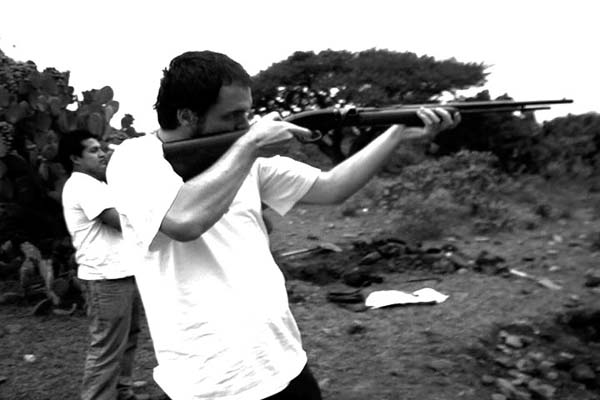
cocks 82, photography by Wes Heine



The Old Man in the Tree
Bill DeArmond
Once upon a time there was a young lad named Frodo who...wait a minute...that’s not it. Was it Luke? Nah! Too biblical. Lancelot? Too weird. Let’s just call him Bubba...Prince Bubba.
So – once upon a time there was a young lad named Prince Bubba, who was sent on a vision quest by his father, King...King Bud...Budwig the Confused.
Since King Bud spent every day testing the quality of his ale in his brewery, he had a perpetual hangover and little time to teach his son the ways of the world because...because...because his mother, Queen Latifa, had been barbecued and eaten by the evil dragon...What the hell was its name?...Oh...Hell...the evil dragon Hell who, when he found out Bud had a brewery, said “Sorry ‘bout that” and they became partners and that’s how we got fire-brewed ale.
Anyway, Bubba was into his fifth day of wandering aimlessly about the woods looking for his vision quest when he came upon a village peopled by withered-up old men who...wore only green.
And the elder, a man named...uh...Greenjeans sauntered up to Prince Bubba...well...he was too old to saunter...so he hobbled up to Bubba and asked, “What can we do ye for?”
“Dude, ye looks like a raisin,” praised Bubba. “How old are you anyways?”
“My name be Kelley Greenjeans and I be 37. ‘Tis the fine quality of the ale in these parts keeps us so healthy.”
“Hey, I’m, like, Prince Bubba, you know. My Dad makes your brewski and he sent me down this road to find the purpose of life or the closest McDonald’s – whichever came first. And I was wonderin’ if you could, like, point me in the right direction ‘cause there’s, like, two roads forking in the woods and I’ve been, like, goin’ ‘round in circles for five days and I don’t wanna take the road least traveled by.”
“All life is a circle, me son. Men spend eternity chasin’ their tale.”
“You mean like a tale-story? Or a dog’s tail?”
Suddenly Bubba felt a small tugging on his tunic. Looking down he spotted a chimp dressed in a green tuxedo.
“Dude, what a monkey suit!” admired Bubba.
With that the chimp began a furious series of hand...or paw...gestures which Bubba, who had just gotten a degree in Native Animal Sign Acquired Language (NASAL), was easily able to interpret.
“My name is Fred,” signed the chimp. “I’m the incentive incident to get you past this exposition. If you are searching for the road to the meaning of life, then I must take you to see The Old Man in the Tree.”
“Cool! Lead the way, my furry buddy,” signed Bubba.
“You don’t have to sign,” signed Fred. “I read lips. Plus you’ve got a lisp with your little finger. You just called me your ‘furry butt.’”
So Bubba and Fred set out to find The Old Man in the Tree in what has to be one of the most curious fairy tale openings you’ve ever read. (If indeed you’re still reading and I’d be surprised if you still are. I’m still hung over from too much of King Bud’s ale and writing is the only thing that sobers me up. What? Shut up and be an epic narrator? Stop drawing attention to yourself? Well, exsqueeze me!)
Sorry about that folks. This is the editor writing. We’ll cut the narrative down and get to the good stuff.
So, anyway, to make this short story a little shorter, they made their way through the woods, past the pit of fire, over the bridge of sighs where they slew the demented ogre, jumped from the Cliff of Doom, landed on the bank of Uppa Creek, killed and ate a wild snipe and ended up at the foot of a hill where high atop lived The Old Man in the Tree.
The house hadn’t so much been built in the tree as the tree had grown up inside the house, lifted it off its foundation with its branches, breaking through the walls, holding it aloft. It was a Remax nightmare.
“Cool digs,” Bubba told Fred. “How do we get him to come out? There’s no bell or nothin’”
“Call out to him,” signed Fred.
“Hey, Old Dude, wassup?”
After a pause the door creaked open and The Old Man in the Tree popped his head out.
“Who the hell’s bustin’ my chops this early in the morning?”
Bubba took a step back fearing the wrath of some Merlin-like wizard. But he was just a little Old Man in a Tree who looked a lot like that comedian Bubba had seen recently on HBO...George...something.
“It is I, Bubba, son of Bud the Confused. I have come for your wisdom to aid me on my quest.”
“So what kinda quest you on? Is this a damsel-in-distress-slay-the-dragon-live-happily-ever-after kinda quest?”
“Old Dude, I assure you this is a noble quest for enlightenment – or a Big Mac and fries.”
“Oh! The I-just-graduated-and-don’t-know-what-the-hell-to-do-with-my-life quest. I get a lot of those, livin’ so close to the college.”
“Fred said...”
“Who?”
“My friend Fred, the chimp there...”
“You gotta talkin’ monkey?”
“He’s no monkey...he’s a chimpanzee. Anyway, Fred laid it straight that you were the Wise Old Dude to see. That you knew the path to true gnosis...or gooses...I couldn’t make him out too good.”
“You say the monkey told you this?”
“Yes.”
“How? Monkeys can’t talk.”
“He can sign and I’ve got a degree in...”
“Don’t tell me – NASAL, right?”
“Yes, and he told me that you had all the wisdom of the universe...”
“Where’d you find this signing monkey?”
“Back in the village. It was as if he knew my inner turmoil.”
“So you followed him?”
“Yes.”
“Doesn’t that seem a bit silly?”
Bubba had to agree that it was a very convenient plot device but defended his position. “Nature’s creatures know things we don’t. They are in tune with the subtle resonances of life. Plus, Dude, how cool is a talking chimp?”
The Old Man in the Tree jumped down to the nearest branch to the ground so he could really get into the boy’s face.
“Why does every young fart think I should have all the answers?” he began. “You think just because I’m old that I’ve got something special to pass on to you? I’m an Old Man living in a Tree, fer chrissakes! No cable...no indoor plumbing...not even electricity and you think...”
“But I’ve always been taught that with age comes wisdom,” Bubba implored.
“With age comes constipation. I’m half-senile and I’ve spent my life in a tree. Where you think I acquired this secret wisdom? A carrier pigeon?”
“But I read in Jung about how as you get older that male takes on the wisdom of anima.”
“Anna’s ma? Don’t know her.”
“No, anima. This causes his soul to grow and expand and touch the divine Sophia.”
“I ain’t touched nothin’ – let alone a woman – in over 50 years. Look around you, boy. You think any girl named Sophie’s gonna visit this house?”
“But...”
“No, sir. This ain’t no fairy tale and I ain’t no Yoda. This is real life and in real life old people don’t always know everything just because they’ve lived a long time. I’ve been in this tree for a hundred years. Don’t you think if I knew the secret of life I’d a written some book about it? Got me on Oprey and moved to Florida?”
Bubba cast his eyes to the ground, found a quarter, picked it up and put it in his pocket. “So there’s nothin’ you can tell me? There is no secret gnosis?”
“What’cha got?”
“Pardon?”
“What’ll you give me for this knowledge?”
“Well, what d’ya want?”
“How much money you got?”
“Maybe about a hundred dollars or so.”
“You’re about to embark on a perilous journey to the sacred shrine of knowledge and your old man only gave you a hundred bucks?”
“I got plastic.”
“You got two picture IDs?”
“No, but my Dad’s the King and...”
“All the boys say that. You got anything else?”
“That’s it.”
The Old Man in the Tree looked over at Fred. “I like the monkey.”
“I told you, Fred’s a chimp and he’s very sensitive. Besides, he has to go with me. Don’t you know that every mythic hero on a quest HAS to be accompanied by a sidekick for comic relief and revelation of interior dialogue. Haven’t you seen Shrek?”
The Old Man in the Tree thought this over for a long time, cocked his head and said, “I like the monkey.”
“Oh, well...alright.”
“Plus the hundred bucks.”
“What?”
“How am I supposed to feed the monkey?” The Old Man in the Tree said, somewhat indignantly. “Tie him to that stump over there.”
As Bubba obeyed The Old Man in the Tree, Fred let forth a series of phrases Bubba hadn’t covered in classes.
“So you want to know the secret gnosis – the wisdom I’ve gained over a century and a half?”
“Yes, Old Wise Dude – lay it on me.”
“I want you to listen very carefully because I’m only gonna say this once. The secret to life is...You sure you ain’t got some magazines, maybe a jar of peanut butter?”
“We made a deal, now TELL ME!”
“What I’ve learned in my life is this: ‘You may grow too old to cut the mustard but you’re never too old to cut the cheese.’”
The Old Man in the Tree laughed so hard he fell over backwards out of his tree and landed on a barrel of pickles.
“That’s it!?!” Bubba yelled in the Old Man Out of the Tree’s face.
“Yep,” he said as he got up and dusted himself off.
“That’s the stupidest thing I’ve ever heard. How’s that supposed to help me?”
“What’d you expect? ‘There is no spoon.’ Of course there’s a spoon...and a fork...and a...”
“I think you’re just a stupid, stinky Old Dude who’s full a crap!”
“Well, you DID ask. Wouldn’t leave me alone. What’d you expect?”
“Something...I don’t know...profound.”
The Old Man in the Tree Now on the Ground puffed out his chest. “Okay...Here’s your profundity: ‘The message isn’t the message.’”
Bubba looked more bewildered than before. “Huh?”
“The secret doesn’t come from any old fart you meet in the woods, or inna desert, or sittin’ under a tree by the side of the road. The secret is the road.”
“You mean, I’ll find it somewhere down that road?”
“You ain’t listen’ to me, boy. The purpose of life isn’t what may be at the end of the road. It IS the road.”
“It’s THAT simple?” asked Bubba, disbelieving.
“Duh! Now get your ass out there and consider yourself properly schooled.”
“One last thing, Old Dude. Tell me. Which direction should I take? Which road will lead me to my vision quest?”
The Old Man in the Tree Who Now Kinda Liked Being on the Ground thought a moment and asked, “Do you like snow?”
“Not really,” Bubba replied.
“Then go south.”
As Bubba continued down the road on his quest, the Old Man Who Was Getting Back Into the Tree said to the chimp, “Okay, Fred. Now go back to town and fetch us another sucker.”
Bubba, now fading into the setting sun, turned back one last time to wave goodbye to them. And Fred gave him his own salute, telling Bubba he’d always be number one in his book.
|



Last Love Letter
W. Scott R. Brownlee
Zaid Abdullah felt his depression coming back. He was staring at the walls of his college dormitory but saw nothing at all. It was as if he could see right through the walls, peering outside into the warm, breezy spring day of Dearborn, Michigan. Perhaps even further than that. That stare of his probably could see clear across Lake Erie searching for a lost love going to college in Ohio. They were supposed to be together tonight for a Jack White concert. Nuru and Zaid forever, inseparable. And it had been for a long time. Until their second year in college when she insisted on going back to Jordan with him during break. Zaid had played it off, avoiding it as much as possible, blaming ISIS instead of discussing a certain truth that was gnawing away in her guts.
She was black.
A poor black Tanzanian girl with a gift for the violin. She was going to an American University on a music scholarship. Even this would not do for a third cousin of the Jordanian royal family. Zaid had never come clean with the truth. The constant dismissal of having an honest conversation began to make him sick. Each day closer the break drew near, Zaid felt worse.
By two days out he couldn’t take it anymore. He went to a strip club with his roommate. Several lines of cocaine and whiskey found Zaid in the back seat of some stranger’s car having sex with a stripper that stank of heavy perfume and a rotten vagina that left its smell on him the entire night he spent in jail. The hooker and Zaid were arrested for breaking into the vehicle.
An entire night without sleep slowly crept by. Black gangsters of Detroit kept staring at him as each second of the clock’s hand took an eternity to tick along. Zaid lost his shoes, shirts and watch. The gangsters didn’t steal his pants because of the dirty sex smell on them. Though tears threatened, Zaid held his composure intact, solidifying his nerves to brace for the long night.
Centuries later, it seemed, daytime did come but freedom didn’t arrive until well past noon when Nuru picked him up. It was over as soon as she smelled the sex on him. That’s when the tears fell from his face. He had gotten down on a knee and proposed to marry. Nuru walked away, never looking back. The last thing he saw was the slender frame of her hips and shoulders moving furiously and far, far away.
After months of texts and Facebook messages, Zaid tried to actually call her, the old fashioned way, but she never answered. Desperately, the last thing he could think to do was writing her a letter with a black ink and lined paper. It was a tear stained letter. He had explained it all, came clean and asked for forgiveness. Marriage was suggested but the relevance of that circumstance would depend on a variety of factors, namely Nuru being in agreement to such a concept. The letter had been sent off two weeks ago. Now Zaid was resigned to his inevitable defeat on the battlefield of love. For days he had sat in his room moping around sadly, quietly staring at the walls.
His roommate stopped by and hopped on a PS4. He was playing Call of Duty Advanced Warfare for quite some time before he remembered that Zaid had gotten a letter from the campus post office. Falling into Zaid’s hands, a while passed before he began to register in his brain that it wasn’t a bill. Instead it was a return letter from Nuru.
It was a hand written response.
With shaking hands he tore the envelope open and read the words in her beautiful hand writing. The words were lofty and eloquent, almost preaching, but summarily there was a tentative understanding that she had of their situation. Because in her village there were class structures as well, where certain lines were forbidden to cross but now that they were in America that all could be forgotten. Nuru suggested that they start brand new and apply for U.S. citizenship. With his degree in Science he could teach or work in engineering, preferably the latter for a chance at wealth. Then the letter was full of ideas of how to successfully become a resident of the United States. They could pray for President Obama to grant amnesty for illegal aliens or they could simply over stay their visas. Finally the grit of the letter came. Zaid would have to go to the doctor with her to get an STD test. As embarrassing as it would be, the practicality of the notion made sense. Regret stung him once again, like cement being poured around one’s feet when a monster is near.
By the gods of the world he would do anything for Nuru. Climb up on top of the building. He would. Zaid would scream out to the gangsters that stole his clothes. He would scream out to Detroit, to Michigan, to the Great Lakes, to all of the USA, in fact, to all of the inhabitants of the planet Earth, to all of the animals, plants and protozoa included. He would. Zaid would scream into all of the cells of every living organism, into every atom of the universe. He would scream his love for Nuru. This love was the cure for death itself, for love was eternal. By the gods he felt fine. He set the love letter down on his bed and smiled, long and merry.
Zaid decided to clean up. Several days had passed since he had shaven or showered. His roommate laughed at him, saying that with his olive skin and bushy beard that he could be mistaken for a terrorist. Zaid was laughing about this memory, standing naked in the hot steamy shower, when he heard the thunder of gunfire echoing in the hall.
First thing to occur to his shuddering senses was instant defecation. Then his legs became jelly. Zaid could hardly walk. He slipped in his poop and fell down onto the hard shower floor. With shaking hands, he hastily wiped the poop and soap suds off of himself. Automatic gunfire filled the bathroom so loudly with a dizzying din that Zaid’s ears were ringing terribly. When he saw his fellow students run through the community bath, sheer terror strewn upon their faces, Zaid instinctively followed the herd. As he turned the corner into the hallway he watched the three students in front of him start twitching about and fall down. Blood painted the wall in an instant. Zaid spun around and ran the other way toward a stairwell. The gunman shouted at him. It was in Arabic. Zaid knew that the gunman was saying to stop as he reloaded a clip into his AK-47.
Zaid did not stop.
He jumped like an athlete down the steps, not touching a single one. At the bottom he tucked and rolled back onto his bare feet quite nimbly. The terrorist was at the top of the tops when Zaid turned another corner. The shooting was occurring above him. He could tell that much. An awareness settled into his terrified mind that he could outrun a man but not his bullets. But perhaps outside he could run into traffic or into one of the yards neighboring the campus where the elderly white people mowed their lawns on small tractors. Oddly, he reflected that he loved the scent of fresh cut grass. Mind racing with an absurd thought process, Zaid ran past several students standing at their doorways. He shouted for them to run but instead they unexpectedly laughed at his nudity. Zaid didn’t wait around to explain. He barged into a room, past a tall, skinny black student with a comb stuck in his hair, opened the window and jumped out.
Zaid landed two stories below onto his feet, tucked and rolled. This time he felt his ankle sprain but his adrenalin was at such a high volume that the pain was hardly noticed. The gunfire was continuous but not as loud outside. There weren’t any students on the lawn under the tall oak trees. A Mexican was mowing with a tractor. The headphones he wore deafened him to current events unfolding on campus. The Mexican didn’t see Zaid jump from the window. Zaid figured compassion would be served and the Mexican would be spared slaughter if he simply ran past him in the nude.
It worked.
The Mexican took off his headphones and yelled something in Spanish. When he heard the screaming and gunfire and yells in Arabic, the Mexican began to run as well, not bothering to turn off the tractor. Zaid hid behind a utility building. He watched the Mexican run beneath the oaks trees toward the road. A shot rang out and the Mexican toppled over. Three more shots raked the Mexican’s twitching body. Zaid stayed hidden behind the building.
Minutes ticked away but each stroke of a second seemed to last an hour, immensely worse than his night spent in prison. Zaid listened to the terrorists shouting in Arabic. They were asking people if they were Muslim. Some were shot instantly. Others were further questioned as to whether or not they could recite a Sunni prayer. Zaid didn’t know his prayers that well. He wasn’t certain if he knew the prayer they asked about. Then he remembered Nuru’s letter.
Impossibly, Zaid ran back to the college and climbed into a lower level window that a Japanese student was jumping from. Moments later he heard the Japanese student get shot. He wondered why the sniper hadn’t shot him upon re-entry, perhaps it was the mutual absurdity and unexpectedness of a man deciding to come back into the carnage and the strange fact that Zaid was naked. But onward he went through the room, with a deep breath and blindly into a hallway. Once he saw that the hallway was clear, he wasted no time in running back to the stairway. Beneath the steps he paused for a breath. Students were in a flurry as they sped past him. It sounded like the gunmen were moving upstairs from the sounds of the shots.
Zaid ran past his fellow students back up two flights of stairs. The first and second floor were empty, but on his floor, the third floor, he saw the dead bodies of students in the hallway and in their rooms. None were left alive. The gunmen were definitely one floor above him. Zaid ran into his room and found his roommate dead on the floor, his brains leaking out of his skull and dripping onto the floor. Zaid could see where he had pissed on himself. A sickness was in his heart at this macabre spectacle.
There was Nuru’s letter sitting exactly as he had left it. Zaid swiped it up and ran back into the hallway past the dead bodies. He heard a gunman slightly ahead. It was in one of the forward rooms so Zaid ducked into an adjacent room. Zaid hid behind a door. He held his breath as the gunmen walked past, kicking the bodies on the floor. Zaid tip toed out when the gunmen turned around a corner. He skipped barefoot to the stairway, looked up, saw nothing, and quietly skipped down two flights of stairs. On the last flight of steps there was a gunmen, a dangerous looking kid with tattoos, piercings and a young man’s woolly beard. Hatred filled his eyes as he pointed the Ak-47 at Zaid.
“Why are you nude?” the gunmen said in Arabic.
“I was in the shower,” Zaid responded in Arabic.
“Are you Muslim?”
“Yes.”
“Say your prayers.”
|







Bella and the Billionaires
D. D. Renforth
Eight billionaires met at their club every three months to discuss the progress of their decision to create an underground town in case of an apocalypse which, they had decided, was imminent. The facilities planning was a critical part of the conversation—they wanted to be as comfortable as possible—but other areas were equally important. They needed servants to keep up their lifestyle, they had to determine what they would do in the long months, perhaps years, of living underground, but, most importantly, they had to decide who would be the chief executive of this underground town. One town would not need more than one boss. An entire city like New York has only one mayor. Who of the eight would be the leader?
One of them suggested that, since only one leader was needed, they take turns every two or three years, but the idea of alternating command was worrisome. That was not their style. They knew that the townsfolk would compare them, like a popularity contest or an Olympics. Only one of them could take the gold.
Another billionaire suggested a contest. The winner would be the ruler until death, and the rest would be his chancellors in charge of the various departments required of the apocalyptic town. The contest did not excite them but the revolving leader idea was worse. So they decided on the contest.
Various contests were possible but the choice should be fun, even if it did not work. They decided that each would spend an evening at the club with the same woman, whom they described as “single, mature, attractive, intelligent, and an experienced manager.” The woman would be unknown to all of them, her name picked from a jar filled with names of single women they would glean from business profiles available on numerous online sites. They would ask her to select which of them would make the best leader. She would not know that she was selecting a post-apocalyptic ruler.
So they picked a name and the potential fate of the post-apocalyptic future fell into the hands of Bella Allegra.
The group of them met Bella at their club and explained the procedure.
“So basically you want me to interview each of you and then decide who would make the best leader?”
They nodded.
“And I would know this after one interview,” Bella said, again with a sardonic tone.
They nodded.
“Leader of what?”
They said that they wanted her opinion of their leadership potential.
“Are you guys married?”
They nodded.
“This is some kind of prank, isn’t it?” Bella asked. “You have a bet on which one I would choose, right? It’s an ego thing, a guys’ club thing.”
They did not respond.
“Oh, hold on here. I get it. You have something else in mind. Maybe you’re telling me this, but in fact you’re actually betting on something else. Now that’s naughty.”
Again they were quiet.
“Have you done this before?” Bella asked.
They shook their heads.
“And you will pay me one thousand dollars per interview?” Bella asked.
They nodded.
Bella rose from her chair and the glass of wine they had offered her.
“I don’t think so, gentlemen. I don’t know any of you and I don’t like doing things when I don’t know what’s going on. So, I pass.”
She was about to leave when one of them, Ryan, the one who had invited her, spoke.
“Please sit down, Miss Allegra,” he said gently. “I think you’ve got the wrong idea. We’re interested in what you think of us as leaders. These meetings will have only that purpose, none other. Simply spend an evening with each of us, at this club, and then pick one of us. Ask yourself: ‘Which one of them would I vote for, if they were all running for president?’”
Bella looked at them all with a serious and concerned face.
“Then what?” she asked.
“Nothing,” Ryan replied. “You’re done. Take the money and go.”
“Suppose I wouldn’t vote for any of you?” Bella asked.
The eight all stared at each other again and hesitated.
“You must pick one of us,” Ryan said, “regardless.”
“For example,” Bella said, “you already have one count against you.”
She stood up and waved her arms about.
“You belong to this club,” she said. “I’m not going to vote for somebody for President who belongs to this club. This club is for elitists and rich people. What would people here know about ordinary life? And what makes you think I know anything about leadership?”
“We read your profile,” Ryan said. ”You’re a senior manager, educated, and mature. You have a number of people reporting to you.”
“I still might pick none of you,” Bella said.
A surprised look appeared on their faces.
“Look at you,” Bella said, looking at their faces. “You’re shocked. Why is that? What have I said that’s so difficult for you to grasp? Don’t answer. I know why. Because you think the opposite, don’t you? You think because you belong to this club and have money and position that people would naturally want to vote for you, because you’re worldly successful, and being worldly successful means you’ve made the right decisions, and if you’ve made the right decisions, then you’d be a darn good leader, right?”
They said nothing in reply. Her frank tone surprised them.
“Would it be better if we were failures?” Ryan spoke up. “If we were broke and lived off the street as beggars? Would that make us better leaders?”
The billionaires all chuckled.
“You can laugh, but I’m not going to vote for someone simply because he can make a profit or doesn’t dress like a beggar. There are a lot of idiots who lead big companies and wear expensive clothes and they still can’t stop their company from going bankrupt. And then there are those corrupt fellows who lose millions for investors and jobs for the people who work for them.
“On the other hand, I’m also not going to vote for someone because they can’t make a profit. We’re all beggars, in my opinion, trying to survive, some of us have just made bad choices, bad luck or have no connections. The guy I report to right now, he got his job because of his father, not because he deserved it. That’s good fortune, not talent or a special ability. He makes a lot of money, much more than I do, but he’s done nothing to deserve it. There’s only one thing he’s good at: acting like he’s important. Without me and other managers, honestly, the company would sink.
“I have a theory,” she said, leaning forward and talking to them as if they were her students. “If you take that bit away, the bit where somebody gets an opportunity because he has money or knows somebody, then you’d have a lot better situation in every field. Because there are too many geniuses who are broke or don’t have contacts.”
“Your point?” Ryan said.
“The first question I would ask about someone wanting to be a leader is: how did he get here? Did he make it on his own or through money or contacts? I also look for what my Dad called character. Without character, nothing matters. Look at the doofus I have for a boss. How can I respect him when he has no business being my boss, he has a filthy mouth, grabs at the women, and lies constantly? He knows he got the job unfairly, but he doesn’t care.”
“Anyway, I’m in the dark here,” Bella said, opening up her purse and putting on lip gloss. “Aren’t you all leaders now? Why would you want me to select one of you as a leader? Aren’t you sick of being leaders?”
“We have a project in which only one of us can lead, so we need to find out which one of us would be best. We thought we would find an intelligent, objective person to decide, not someone who knows us or is in our businesses.”
“I see. You want one of the little people to help you. OK, so you eight are going into business, but only one can be the president, is that right?”
They nodded.
“Tell you what. Let me make this quick. I see what you’re all about. You clearly respect money. Tell me the one who’s worth the most and I’ll select him.”
“So wealth is your criterion?” Ryan said.
“No, that’s your criterion,” Bella said. “Gone are the days when an Abe Lincoln could be President. Do you really think anyone can run for President without a lot of money? Anyway, I digress. Clearly money’s your thing. And it’s your project, not mine.”
“We know who’s the richest,” Ryan said.
“Good. Then can I go? I have other things to do and I feel uncomfortable in here. My sister’s been begging me to help her choose a dog. Which dog, she asked me, will best fit into her home? Big decision, gentlemen. Choose the best dog. All that I can do.”
Again Bella got to her feet, finished her wine, and walked to the door.
“Fine!” the billionaire Tom spoke more loudly than he wished. “Come back! Fine.”
Bella returned.
“Our wealth will not be a factor,” Tom said, “though, to be honest, it’s more interesting than you might think. Not even all of us earned our money.”
“Not surprised at that,” Bella said, again sitting. “OK, so let’s remove money as a criterion “Could I have another glass of wine?”
“But if you remove wealth,” Bella reminded them, “then you can’t include what house you live in, what clothes you wear, what clubs you belong to, your investments, properties, and so on. All gone. So what’s left as criteria on which I can select the best leader?”
The group became quiet again.
“John Lee is a pretty good golfer,” Tom said.
“True,” Ryan said. “Yes, we all play golf. So golf. Yes, we all golf.”
“Is that a worthy criterion for a leader?” Bella asked.
“I think so,” Tom said. “We do the occasional deal on the course.”
“So the leader should golf,” Bella said, “but since you all golf, that won’t help us here.”
“True,” Ryan said.
“What else?” Bella said. “What have you done to keep yourselves up to date?”
They looked around at each other and shrugged.
“There’s no need,” Tom pointed out. “We’re already running our companies. We have people who do that, you know, strategists and idea types. I think I peeked in on a management training course once, but only to observe the trainer and the course. I wasn’t really in the course. Most of us never found college useful. Did Bill Gates and Steven Spielberg graduate from college?”
“Warren Buffet has a Masters,” Bella rebuked.
“He does?” Ryan said. “Well, he also plays the ukulele at meetings.”
They all laughed.
“You know,” Ryan said, “I’m no fan of all these upgrading courses and human resources programs and MBAs and conferences anyway. You can’t captain a ship in a class. I say: If you need that to manage, then you don’t know what you’re doing. Just do it.”
They all nodded that they agreed with Ryan.
“So none of you have taken courses or skill development programs?” Bella asked.
“A couple of us have MBAs but we agree that it should not be used as a factor.
“Fine. But there must be skills and abilities special for a leader.”
“I can answer that,” billionaire Sana said. “You can’t learn how to do it through a bunch of case studies. It has to be in you. Managing people, inspiring them, bringing a vision, having ideas, and managing money wisely, they’re not skills as such; they’re natural talents. We all have those talents.”
“Which means, at least to me,” Bella concluded, “that any of you could be the leader. So choose by lottery. You’re all the same.”
Once again Bella rose up from her chair. The group was surprised at her suggestion.
“What? No, no, no,” Tom said. “We’re not the same.”
“Of course you are,” Bella said. “You’re leaders, you have the same skills, your mindset has been molded for business, and you’re all successful. Just draw straws. It’s simple. You’re clones of each other.”
“But this project is special,” Ryan said; “it’s not exactly a business. It requires other skills. It’s more like a community leader.”
The others nodded. They wanted someone outside to choose.
“I see,” Bella said, sitting down. “Community leader? Hmmm. OK, then you may be in trouble, because, from what you’ve told me—which isn’t much, I don’t even know what this project is about—what you do is all you are. And what you do is not necessarily transferable to every kind of leadership. Each of you specialized, didn’t you, because you were so desperate to be rich and successful in your field? You may have other undeveloped skills or abilities, but nothing else for which you’re trained. Your education, such as it is, has had one focus; anything else has been dormant for a while. You’re now, it would seem, brilliantly one dimensional, but when it comes to what’s outside that dimension, you’re no better than any other manager or worker, perhaps worse because you might find it difficult to adapt. I’m not saying you couldn’t adapt, but if it’s that different, there would be a learning curve. It could be humiliating. It’s like asking Bill Gates to conduct an orchestra or Spielberg to manage a homeless shelter or Buffet to be a school principal. Learning curves are tricky for a new leader. Everyone’s watching. At present you can hide behind the mistakes of others because you’re accustomed to using others and approving and disapproving of others’ ideas and decisions. In a new situation, your ignorance would be exposed, your character could not be hidden.
“Oh, then there’s character. You’re in that class of people who think they’re entitled. That’s your character. That may work in the bubble you live in, but in another context, I think you could offend people and sooner or later they’d find a way to get you, and who knows what they would do to get you.
“Anyway, that’s all I have to say. Take it or leave it. And keep your thousand dollars. You can pay for the wine. I have to get to my sister and pick a dog.”
Before Bella could leave, they asked her to wait while they went off to a corner and discussed her comments.
She waited a long time. When they returned, they sat down and stared at her until she was uncomfortable.
“What is it? What have you decided?” Bella asked.
They paused for another minute, looking at her, then at each other.
“We’re going to tell you about the project,” Ryan said.
Bella waited and still they did not speak. Revealing the secret was difficult for them.
“Yes? What is it?” Bella asked impatiently.
“We’re preparing for the apocalypse,” Tom finally blurted out.
Bella did not know how to respond. Of all of the possible scenarios, she had never considered the end of times.
“One of us must be the leader in that time,” Ryan said. “Clearly not all of us can lead.”
They all waited for Bella to speak, but she simply stared ahead, thinking of the context in which she found herself. Now more than ever she wanted to leave. She was not going to pick the possible future leader of the apocalyptic world. An unplanned wide smile came upon her face.
‘These men are sitting around planning the end of the world,’ she was thinking, ‘and I’m thinking about what dog would fit into my sister’s family. No, I’m actually thinking about whether I would use the bathroom here in the club or whether I would go to the one in the fast-food restaurant nearby because it is always clean. That is the choice in my mind.’
Slowly she stood up and shook her head.
“Gentlemen, I’m not going to be involved in this anymore,” she said. “I’m not going to select the person to run the apocalyptic or post-apocalyptic world. I want this here world to work.”
Bella quickly walked away. She decided she would use the facilities in the fast food restaurant so she would not have to see these people anymore.
|











Desperately Seeking A Legacy
John Amendall
People drawn to the White House by Potomac Fever commonly contract Legacy Fever leaving office.
“How will history treat me? What will be my legacy? How will I be remembered? What influence did I exert on domestic and global issues? What will be my ranking? With James Buchanan or Jimmy Carter or with Wilson or Teddy Roosevelt?
The last days of a president’s office resemble the Last Days of Pompeii wherein they consciously attempt to enhance their image. President Obama was no exception desperately seeking accomplishments to highlight his exit. Something to be proud of.
He released 22 detainees from Guantanomo (GTMO). These people were suspected terrorists. Now they’re free to pursue their goals. He commuted sentences or released over 1200 prisoners from American prisons. These people were charged with dealing marijuana and other drugs. Obama consistently underestimated these people significantly contributing this national ruinous habit. This number of commutations exceeded by several orders of magnitude the numbers of other presidents in the modern era.
The president exchanged five known active terrorists to obtain U.S. Army sergeant Bowe Bergdahl’s release from the enemy. The military did not share President Obama’s decision.
When U.S. Army Major Nidal Malik Hasan killed 13 people and wounded 30 others at Fort Hood Texas in 2009, the president called this an act of domestic violence rather than terrorism. Since Major Hasan was a Muslim the president didn’t want to offend Muslim sensibilities. Nevertheless the Major was judged guilty receiving a death sentence which will conveniently not be performed during Obama’s office.
When history books are written about the Obama presidency there will be a large range of candor and accuracy between Obama apologists and mainstream historians.
The Federal Reserve Bank of St. Louis prepared charts of Obama years on their own web site. The following is based on these charts.
Student loans soared ranging from $100 million in 2008 to over $900 million in 2015. Almost 9 times greater during this period. While student loans are a sensible federal investment for the nation defaulting payments have increased accordingly. Its been predicted that student debt will be $ One trillion by 2017. Bernie Sanders running on a platform touting free college education with Hillary Clinton supporting the same at junior college wasted their irresponsible rhetoric because the president had effectively preceded them. This program requires regular control and sensible accountability.
Food stamps program also soared ranging from $30 billion in 2008 to $70 billion in 2015. After reelection, within a week President Obama via executive order poured billions of dollars into the food stamp program. Almost 2.3 times greater during this period. A conservative estimate by the government is that there is at least $ One billion per year of fraud associated with the food stamp program. Food stamps were originally designated for food staples (meat, chicken, vegetables, dairy products). Now they can be exchanged for almost anything on the shelves (electronic toys, DVDs, cigarettes). People buy something cheap accumulating change which they use else- for other purposes. The original intent of the program has been grievously compromised. Over the years the government sold its soul to lobbyists seeking to enlarge the range of original products covered by the food stamp program.
It is ironic that the Department of Agriculture responsible for administering the program, posts signs in our National Parks warning visitors not to feed the animals lest they lose the capacity to feed themselves. The government’s concern for the animals is commendable but misdirected.
When Obama took office in 2008 the Federal Debt (GDP) was $10 trillion. Faced with this challenge and the responsibility to reduce it, the figure was approaching $20 trillion by 2015. While it was irresponsible that previous administrations had allowed the GDP to increase to $10 trillion, the Obama administration doubled this in eight years. Failure to address this looming and threatening problem was gross fiscal irresponsibility.
Money printing ranged from $1,600,000 in 2008 to $4,000,000 in 2015. This was an unprecedented increase. There was a strong association between money printing and student loans, food stamps and the GDP. His administration solved this problem by simply printing more money. Fine tuning government spending by reducing Department budgets (5%, maybe more in some Departments) might’ve been a more sensible and fiscally responsible solution.
Health insurance costs ranged from a CPI less than 105 in 2008 to 124 CPI in 2013. Dogged supporters of the largest federal social program (Affordable Heath Care Act –Obamacare) since LBJ’s Great Society railed against the greedy avaricious insurance industry. Supporters conveniently ignored Obama’s reassurance to the public that there would be no appreciable cost in insurance premiums. It is predicted that insurance premiums will increase by 25% in 2017. The president chose his own legacy changer failing to deal with the GDP.
Throughout his presidency Obama repeatedly urged the U. S. to adopt the U. K.’s program of socialized medicine. This in the face of his own unfavorable program. Confusion about dhimmitude exempting Muslims from observing Obamacare continues to draw attention. If this exemption is upheld, it would permit entry of sharia into a Federal program.
Before the vote on Obamacare no less a person than congress woman Nancy Pelosit said: “Let’s pass the bill (over 1000 pages). Then will find out what’s in it.” If an elected official doesn’t read these bills who does? Don’t they have staff to attend to this major responsibility and advise them accordingly? It’s not reassuring to know that the leader of the minority, sight unseen about the bill, uncritically and enthusiastically supported it, coincidentally assuming a laissez faire attitude administering this controversial bill. All this occurred under Obama’s watch as the GDP soared. Obama supporters have considered this the high water mark of his presidency.
Labor force participation declined from 102.5 (index 2009=100) to 98 in 2015. There was an inverse relationship between labor force participation and the Federal debt. As Federal debt increased labor force participation declined.
Workers share of the economy was 335 CPI in 2008 and 340 in 2014. Wages were static and nearly 40% of Americans were not working. Accordingly under Obama the nation has significantly moved in the direction of a welfare state. Some of the largest cities (New York, Chicago) in the U.S. have huge and expanding welfare populations. Runaway welfare breeds mediocrity coincidentally decreasing freedom with its increased dependency on the government.
Home ownership declined from 68% in 2008 to 63.5% in 2015. In summary student loans, food stamps, GDP, money printing increased from 2008 and labor force participation, workers share of the economy and home ownership declined. Costs of student loans, food stamps, GDP and money printing continue to rise.
The above brief of America’s decline from 2008 to 2016 must be considered as a significant part of President Obama’s legacy. His supporters conveniently ignored this dismal record.
Other examples of his legacy are not as easily quantified. The president through another executive order doubled the time to receive welfare benefits and removed the important work stipulation for welfare recipients.
He reduced the efficiency of the border patrol and other state policing agencies to question illegal entry after immigrants entered. They were only authorized to stop and interrogate immigrants charged as felons. How many terrorists have entered our country under the umbrella of unchallenged immigration? This is the same man who facilitated immigration for 2500 Palestinians and openly declared a willingness to accommodate 10,000 Syrian refugees. Would the president have been so sanguine if all these immigrants were potential Republicans?
By omission he failed to enforce existing federal laws allowing sanctuary cities to blossom and flourish hosting illegal immigrants. New York, Chicago, Los Angeles to cite a few, proudly defy federal laws in this regard. Americans are paying to feed, house, educate and provide medical services to millions of people not paying taxes.
It has been estimated that the U. S. spends about $338 billion a year on undocumented illegal immigrants. The nation has an obligation to take care of its citizens incapable of taking care of them selves. We have no obligation to assume the unnecessary burden of supporting illegal immigrants at the expense of our own population.
During the debate involving sequestration the president closed the White House to tours including visiting school children to save money and the same for National Parks.
The White House and National Parks belong to the people not the president. The latter is only the steward of these facilities. It is ironic that the man who closed the White House to public tours saw fit to “treat” the public to a TV tour (CBS 11/20/2016) of the White House in his last full month in office during the Christmas season. Presumably this gesture made up for his previous executive order.
The president removed guided missiles emplaced earlier in Poland with their cooperation by the Regan Administration. This decision facilitated Putin’s bold occupation of the Crimea and portions of the Ukraine further threatening eastern Europe. This position was consistent for someone who before his election on TV considered our national anthem offensive to other nations. “Rockets red glare/bombs bursting in mid-air” were deemed unnecessarily belligerent. We mustn’t upset other nations.
His administration was responsible for the present treaty or understanding with Iran concerning their commitment to expand its nuclear program. This domestic and globally unpopular commitment contained no agreed upon inspection requirement. In addition, we released hundreds of millions of Iranian funds (a prime supporter of terrorism) presumably frozen earlier because of their aggressive nuclear program.
The Obama Administration finally acknowledged they were aware of Russia’s efforts at cyber hacking in October and probably earlier. Contrary to his empty claim of a transparent administration, the public was informed after Trump’s election. Suggesting collusion between Trump and Putin pertaining to the election’s outcome was a thinly veiled excuse for Hillary Clinton’s loss. Striving for lost credibility the Obama Administration hastily responded by deporting a number of Russian diplomats. While Obama knew cyber hacking was going on, what did his administration do to solve this very serious security breech? So much for a fluid transition between parties leaving the Trump Administration to sort this out.
The Obama Administration’s failure to support the only true democracy (Israel) in the explosive mid-east was misdirected. Israel and Palestine have important and serious issues to treat. Resolution of a one state or two state structure will be a challenge for both countries to achieve, but this might’ve been done without the intrusion of the UN. The latter has historically been critical of or outright hostile to Israel. The Obama Administration unequivocally threw the U.S.’s considerable influence behind the UN’s recent resolution for sanctions against Israel. It took President Obama five years to visit Israel. While we continue sub rosa to send millions to support Israel, we have publicly danced in attendance to the UN. This was another problematic position the Obama Administration generated leaving it for Trump’s presidency to resolve.
Perhaps the biggest legacy of the Obama Administration was that the nominate leader of the free world failed to lead. During his first term President Obama took his apology tour to the mid-east excluding Israel criticizing American exceptionalism. Imagine. A President of the United States apologizing for the nation’s prominence in global affairs. We played a role in helping to win World War I. We played a major role in winning World War II. We financed the Marshall Plan to revitalize Europe. No insignificant feat. We’ve supported NATO with a huge, long term, financial and military contribution. We’ve provided the site and supported the activities of the UN.
A French diplomat railed against American Empirialism.. General Colin Powell responded: The only real estate we want in Europe is a place to bury our dead. Over 100, 000 American Service men and women, who served in Europe, are buried in cemeteries throughout Europe. How many countries from other parts of the world can make this claim? Another European diplomat questioned using English as the language for a European conference. An American diplomat responded: We might be speaking German if it wasn’t for us. What was the president apologizing for?
Based on the apology tour after three months in office he was unbelievably nominated for the Noble Peace Prize which he received in 2009. Presidency also includes the title and responsibility of the Commander-in-Chief. Should a president in office accept the Noble Peace Prize? Such an award would seem counter-intuitive for the person charged with managing its armed forces. Would this award handicap a war leader’s decisions to commit military forces?
Obama overly controlled and restricted potential military action at critical times in Syria which might’ve produced significant results for the future. His commitment to effective action was inconsistent and restrained. This obvious vacuum of leadership was quickly filled by Russian-Turkey action which aggressively brokered a cease fire treaty between Syria’s Government and rebels. They clearly co-opted America’s leadership role, diminishing our influence in the mid-east and the world. The recent emplacement of troops in Poland may be too little too late.
It shouldn’t pass without noting that from the Holiday season in 2016 to January 20, 2017 President Obama appeared on TV three times (White House Holiday Tour, farewell to congress, the History Channel) and a major farewell address at McCormick Place in Chicago. Coincidental with this the Life Style section of the Chicago Tribune (Jan 15) presented a piece “Tallying Obama’s Legacy.”
The piece presented a review of two books assessing the President’s achievements. The apologists struck fast. The reviewer assured us that these books were “not the fly-on-the-wall White House histories or Rush-to-print Obama biographies.” According to the reviewer both books were laudatory about Obana’s accomplishments.
“His actions to turn the economy around were measurable and generally accepted as positive out comes in the reality based world.” The rush to canonization stimulated by TV appearances and these books certainly supports the title of the present piece Desperately Seeking Legacy.
The present account is the barest outline of some of Obama’s legacies. Mainstream historians will provide a more definitive picture. In view of some quantitative data presented herein; for now we’re left to ponder apologists’ accounts.
|



My Large Coke is Bigger Than Yours
CEE
I’d like to start this dissertation, with some thoughts on Reality as immutable as ground, sirloin, through my own mind:
There is no Tupperware-like item Not Tupperware, which is at all in any way, Tupperware.
Coke and Pepsi, are clearly different items, but no Not Coke, is remotely Coke, and no Not Pepsi, resembles Pepsi in the slightest.
Marcus Aurelius, Clarice. “What is it, in and of Itself?”
Elvis’ voice, is alone, Elvis’ voice.
Lincoln’s axe is no longer Lincoln’s axe, if, post-1865, the whole thing has been replaced.
Curly Joe DeRita, WAS NOT Curly Howard. Period.
...and Scrabble, uncolorful as it looks, is the only word-building game Not standing behind a thatch of expirations and loose phraseologies in contradictory laws, snickering. Scrabble is Scrabble, all others wear army boots.
Above, I have shared opinions. To me, they are anything but. To me, they are written with the finger of God, Himself. And my “Everyone a Narcissist” opinion, also God’s, I can prove by dismantling the world, in less than 3000 words. Attend:
Some, might recall the 2011 incident on an American Airlines flight pre-takeoff, Alec Baldwin’s refusal to turn off his cell and stop playing Words with Friends with both of his friends, when prompted by the flight attendant. The actor, feeling he was being singled out and no doubt harboring rage over having to purchase an extra ticket for his ego, fled to the airplane toilet and slammed the door hard enough to alert the cabin crew. Apparently, other people still were using their phones, but the attendant was picking on him, and he couldn’t even show her his Golden Ticket from Mr. Wonka, because his dog ate it. Baldwin was subsequently left at the gate, denied boarding, and had to catch another AA flight. Cut to him chittering bitter Twitter shits, like your standard rich kid made to live five minutes like anyone else.
Astoundingly, Baldwin received mixed support and backing, despite his gold-ringed fist of entitlement, the childish, reckless, halfcocked behavior usually associated with Iggy Pop on a bender. A talented dramaturgian polished in the art of “powerful baddie composed of sneers and disdain”, he smeared and he tweeted his smears, and AA nor the flight attendant, fought back. The latter, hadn’t the millions for a civil Dream Team, and the former wasn’t about to waste its’ on the new poster boy for Borderline Personality Disorder. Effectively, the one who (to quote Mom) “showed his ass”, was on the side of the angels, as said angels are understood Today, to use their computers not for sin tabulation, but insider trading. Alec Baldwin, sweat cash. He was an unrepentant rich man, flapping his equipment at being made to behave, yet somehow avoiding handcuffs—this of course, showcasing classism at its worst, to which we should have responded societally, like the villagers in Far and Away, and torched the Baldwin estates to ashes. Too many, however, laughed behind their hands or up their sleeve or in your face, and do Today, as they champion Baldwin personally, because of what personally, he means to them. To Me—aside from swaggering belligerence—the man signifies only what Lorne Michaels hands a young person is in fact an end in itself, therefore even Tina Fey required the leg up of cronyism. The “Fuck You” of “I’m Me”, in a post-9/11 America, mandated the federal marshal in the front row stand, pump action 12 gauge already directional, and issue a one-strike-and-you’re-out warning. And those laughing, bully’s sycophants all, now stamp feet and cry foul. And again, I stop comprehending the world.
American Airlines, had every right to do what it did. At least it wasn’t CEE Airlines, which issues all tickets free, in exchange for smashing your cell phone in front of you. It’s really a matter of rules and regs, standards and practices, Thou Shalt or Shalt Not...the enforceable opinion of any entity, down to one, single, solitary individual. And, suddenly, I’m on the side of Gog and Magog Baldwin (exception of pastime—again, every Scrabble knockoff is Not Scrabble, but wannabe, nonScrabble bullshit). He had an opinion, and lost out to another opinion. Might, again, made right...but...if they had not been able to jettison him from the jet? If cells rained, projectile, upon attendants and crew? If security intervening, had been assaulted, guns torn from their grasp, turned on them? Yawning barrel in the face of the pilot, “Get this tub in the air, we’re flyin’ it all the way to the Copa!”
It hit me not long ago, every law, even every safeguard, is an opinion. Like the George Carlin joke about the invention of the flamethrower, “You know, I’d like to set those people over there, on fire...”, everything on the books, grew out of something! Originally, a lot of that something, was faithbased, but the weeding of such has been hard at it, for decades, now. More and more, we dig only as far back as the revamped Y2K of the legal, an edifice of opinions restacked constantly in attempting unity. You’ll never get that unity. I told you that, last time, in “Salvaging America, the Valkenheiser Way”. 50 states, are far too “Rubik’s Cube doing tabs with Tim Leary”, to ever arrive at a country of fronted jars (can anyone name me, the last time a nation achieved that? I can’t write it, myself; it’s too pat). No, regional, is always safer, state boundaries safer still, until we realize any code or list of behavioral admonishments, eventually backtrack to notions out the heads of persons we never knew. Or whom are long dead. Or whom we didn’t vote for, never would, and believe to be Satan in the flesh. And once more, my more vocal anarchist friend’s voice, rolls like the ocean, Starbuck, to my ears, “What makes the government’s might making right, better than my right making right?” For, if we cannot agree, if we also dispense with “better” and tonguekiss Equality, when a rich asshole or angry young ones or the lone wolf with nothing to lose, play it Martin Luther...and if, then, we grey out dropping the hammer, if no blood is shed yet no quarter given...what opinion, triumphs? Or indeed, what opinion means jackshit?
The notion of “societal standards”, even local, is a shaky one, very Kon-Tiki in sailing the seas of diversity and opinion. Though, up close, in 2017 they’re The Great and Powerful Oz, but HD on a lobby card, flat and incapable of audio. They’re not real, just something one says, like “Hi”, or “How ya doin?” or “Gesundheit!” They speak en toto, for barely anyone. They speak fragmented, for very few. In the world I came from, the one I tell you of, taunt you with and revere, that world with billboards in the sky but no signals at all, when “terror” was only sinister and guardian angels were said to exist, there was little give and virtually no quibble. Local standards, were givens, as people willingly, neatly fit into boxes and pews and niches and slots, as a natural, accepted part of the ride. Rare was the dissenter, as day to day Reality, was The Decider...as I put it in a poem that was available in Kindle for about 3 weeks,
If you thought you could make a difference by going
One toke over the Mark Twain,
Pretty much, and Unforgiven-dirty, but, yes, Truth
You died
Michele Mitchell, bursting onto the scene in 1998 with her book, A New Kind of Party Animal, heralded the glorious ascending of Gen X, by way of their power of choice shot through prism of Self—in other words, X-ers did not simply say, “here is where I, predetermined by familial ties and social caste, fit”. Mitchell damned all elders with faint, “I know what Jägermeister is, and you don’t”-praise, but her point about them—me, being one of them—makes my own. There was a place and time, of 98 & 44/100ths% Accord. This, No Longer Exists. So, what we’re left with, is a whole helluva lot of opinions and the jockeying back and forth, The Crusher and Baron Von Raschke circling for position, so to apply the killer hold of THIS OPINION IS ETERNAL...which, is all very 1984, unless you hold said opinion.
Unfortunately for all of us, we’re speaking, on a societal level, of myriad subjects, and whether or not marshals and special agents have to kiss an egomaniac’s ring, is the crux of almost none of them. On the other hand, any issue making it past two people growling over their version of a lunch counter, develops into a comparing of johnsons, an open pissing contest, and thence judgement’s rush to Court TV. Stereo, kneejerk, cry-for-Nursie behavior, every statute and corollary to a statute, as smirking, hulking bullyfriend. And, around the world, they again shake heads. In 1989, on the heels of Tiananmen Square, some of the students, having made it stateside safely, ran the “just this side of Jerry Springer”-talk show circuit. One of the young men, quoting a Chinese professor of his, made the indictment against our culture that “there is no social issue in your nation, which does not eventually become a judicial one.” And, if we question laws and their validity to begin with, if Tommy Lee Jones as sheriff, has only an opinion past his .357 Smith and Wesson, then what empowers that Mudville Nine of a court in DC? Aren’t their pronouncements, merely enforceable opinions?...you know, until the waters are muddied by hairsplitting, or some sidebar issue falling through the cracks of their edict, or a lower court judge writes an opinion, if only for sake of “publish or perish”, and organ grinder music begins, again?
As Andrew Sinclair pointed out, writing on my dear, sweet Prohibition and why it bellied, “Enforcement, is all.” And, Wyatt and Morgan and Virgil Earp, no longer walk through our communities. And if no one is afraid, or enough not afraid enough, if civil disobedience vehement as counterculture, as Civil Rights, is lent to each individual and leveled to “I will smoke where I wish/cross the street where I wish/not repair my muffler if I do not wish and I think All insurance is a scam, so screw you and take your best shot”, what does anyone care, what an old person in a black robe, thinks? For, stripped to these carpet tacks, a policeman, a detective, a joker in shades with lightning-fast ID, at least can stand there, draw Mr. Blammo, and see if he does better than the firing squad in Battleship Potemkin. Totalitarianism, can scarce be defended, but if order can Today exist at all, the National Guard in the opening montage of WATCHMEN, is its only defense. Opinions, convictions, ethics, morals and “oh, no, we don’t want to get in trouble, we’d better behave, like so-and-so”, are individual, no matter loyalties or obeisance. And the unspoken agreement to roll with punches become Bruce Lee footage in number and speed, is another part of the shit paper of the social contract. I probably won’t stand in front of a blue uniform unhooking his holster and hold forth, but if enough Others do, there’s no back up plan. Not anymore. And as for a court so far from me, it may as well be Lovecraft’s “The Strange High House In The Mist”. I’ve been ignoring their supreme opinions since Ruth Bader Ginsburg—she was a lookalike of my stepmother (also “Ruth”), and damned if I’d kneel to that! That’s random, juvenile, and based upon biased, personal constructs...but, if you could un-clot human clique-ishness, that’s most of what you’d get, but for the one’s whose souls were saved by anything John Lennon’s in “God”, was not.
I read online newsreports a couple years ago, re: the impossibility of municipal law enforcement, policing online prostitution...I cite this, in that, combined with observation of the “pick and choose”-quality my own burgh uses upholding local ordnances or its very Municipal Code, it harks not just to the opinions of badges, suits or any department with verbs in its description, but to the fact of Law weighted with so many varied opinions, it displaces more water than the RMS Titanic! There’s too much to remember, too much to enforce, no chance of nailing everyone nor indeed of them, complying. It’s Mosaic Law. Impossible to obey, in the first place. Therefore, the “Protect and Serve” volk, can’t be concerned with every word. Regardless it’s on the books, burned into the page, possibly signed into law by their Dad or Grandad or ancestor who wrote the Town Charter. Insidiousness, then enters in, as not every ordnance or point of code or even public misdemeanor, is created equal, to any uniformed officer; each, has his opinion of what is important, what carries real enough weight to displace water, the personal, sacred cow of the individual sentinel. And, “A la peanut butter sandwiches!!”, the word “judgment”, replaces “opinion”, as in my childhood, “litter” temporarily replaced “trash”. In a world of userfriendly euphemisms, the one eagle eye we all possess, is the eagle’s ear. We know what a person is really saying, hence the “J’accuse!” of racism or sexism, socially responding lawsuits or riots. There Is No Longer A Polite Way To Say Anything, when those who do not like you or whom disagree, are the audience.
The Federalists who gave us our nation, feared The Mob, and with good reason. The difference of our own, ignorant SA of Samuel Adams expecting a share of power in the fledgling nation half dead from killing the British, was a system of thought and behavior, a code like a stick of rock through rich and poor, young and old, literate and craven, drilled and drummed through all but the most depraved...and the system, jots and tittles, was, 230+ years ago, God’s opinion. So, The Mob left off, and the gentry dug in, and in the dog days of 241 years after the Declaration, God has no opinion, but each of us have a Self’s Bible-worth. And few of us stomach fools gladly, and none stomach infidels. There exist at least a few words from friends, foes, rivals, loved ones or personal gadflies, which should merit them, in our judgment, our heads or heartfelt thinking, jail. Or caning. Or execution. Or BDSM Hell, on the way to the gallows. You see this, nongod, and you feel it in your heart, as all smiles are plastic, all pleasantries, affected. Everyone contradicts themselves, none are ultimately loyal, many disagree openly, loudly, rudely and hurtfully on much, and those still living on a diet of cliches tucked inside memes, need to wake the fuck up. If your opinions are built of Gibran and Gandhi and handpicked, dancy-crap torn out of context from paraphrased Scriptures, I’m afraid you’re going to have the same luck the priest did, in the original, preruined-by-Tom Cruise War of the Worlds. And, there’s exactly one thing which can save you, and I’m sorry to reveal it:
In the wreckage of postwar Germany, still a heap of rubble and bones by 1949, a handbill could be found, plastered hither and yon. It had a positive message, seemingly showed as salve, a kind of balm or hail and welcome. A hand, reaching out—one already offering no options. The handbill featured the pipe-firing visage of Josef Stalin, next to the words, “Stalin, der große Freund des deutschen Volkes” (“Stalin, the great friend of the German people”). You’re fairly literate if you’re reading this, nonfriend. Must I lead you by the hand?
The less vocal anarchist friend, once condemned the notion of “personal justice”, seeing it as nothing but a free-for-all of people blowing each other away. Even in the 80’s, it was tough to refute that image for what it was. But, either an anal Company Girl shoots Alec Baldwin for disobedience, or Baldwin shoots her, for pesecution, and either way, someone shoots the other one, because they shot the first one, and you see where this becomes lots of “Sorcerer’s Apprentice” brooms, right? We’ll need ‘em, to sweep up the dead.
You cannot remove firearms from the nation, without a Hitler or a Stalin. Without totalitarianism, utter, forced control, blue steel will always pervade. Too many, will resort to this, once too many of their opinions are quashed by those of Others. With No Ultimate Opinions (whatever these may be), enforced by horrors I can imagine but don’t begin to want to, we’re left with a playing field to be leveled to horizons horizontal. Man, will always choose Self, and too many bear this out in action every minute, no matter they deny me or obfuscate or razz with unfriendly words. “Wherefore by their fruits ye shall know them.” You can only chain Man. You remove the shackles, he’ll kill you with ‘em.
In the Age of Reason, they made a mistake, in taking Man off the leash. The mistake, was the assessment Man was Good. Man, is not, and he wasn’t, Then. He was only sedate, and with an uncluttered mind. We have since filled it, with every image in existence, placing a limited limitlessness, inside a creature only hardwired for survival. It’s right out of the scariest monster flicks I ever saw, that “turn” you can see coming for an hour, before it happens. Man, rich, poor, a beggar, a thief, a doctor, a lawyer, a nonOscar winner, has some words he wants to have, with each of you. This will sound so ironic to be idiot, coming from me, but...agree with as much as you can stand.
|


|

